|
I’m very excited to share that I have received an ASCAP Plus Award for 2017! The ASCAP Plus Awards program rewards ASCAP writer members of children's music, concert music, jazz and musical theatre with a value beyond the scope of performance surveys (those who make a contribution to the music scene but make less than $25,000 per year in royalties from performances.)
The Plus Awards are generally small awards, but they are prestigious and highly competitive. This is my first award and it is quite an honor. The award covers work created and performed in 2016 which included CONSPIRACY THEORIES, PRAYERS IN VILLEFRANCHE, SOUTHEAST BY NORTHWEST and THE BIRDS. Thanks to Maestro Arnaud Caumeil of the Conservatoire de Limonest, the many directors and colleagues who programmed these works, as well as the Fenton Community Orchestra for their countless performances and enduring support! Through its annual ASCAP Plus Awards program, ASCAP compensates those writers whose works are substantially performed in venues and media outside its surveys. An independent panel reviews the applications and makes cash awards to deserving members as well as writers whose works have a unique prestige value.
1 Comment
Last weekend I had the incredible pleasure of hearing three of my works for wind band performed at the Michigan Music Conference in Grand Rapids. Heather Wiggins and her incredible 7th and 8th graders performed "GRADIENTS" and sounded fantastic. The Warren Mott HS Wind Ensemble under the direction of Erik Miller performed "ALCATRAZ" and I was invited to guest conduct. Truly thrilling. Finally, the Okemos HS Symphonic Wind Ensemble performed "ASYLUM" with excellence. It was very fulfilling to hear my music played so well, and in such an incredible venue. I also enjoyed watching how excited the kids were to perform at the conference, they knew that it was a big deal, and that the audience was mostly music educators. The conference was a blast, it was awesome to reconnect with dozens of my colleagues and friends from across the state, and make new ones at the same time. I also really enjoyed David & Holly Thornton's session, as well as Dr. Tim Lautzenheiser who is always a meaningful speaker.
Yesterday the Warren Mott HS Wind Ensemble held an all day rehearsal in preparation for their upcoming performance at the Michigan Music Conference in Grand Rapids in January. Erik Miller invited me to come by and give my insights and performance notes for ALCATRAZ, and it was an absolute blast to work with this very fine ensemble. When I arrived, Doug Bianchi was rehearsing John Mackey's "This Cruel Moon" with the group, and wow did they sound just fantastic (the piece is rad too). I can't overstate how incredibly well this group plays together, how developed their ensemble sound is, and several soloists were particularly impressive as well. Erik's group is certainly an exemplar of the kind of sophisticated music making that happens in our public schools, and they're going to kill at the MMC. Also, these kids are funny and cool, and spent their entire Saturday working to get better at the thing they love. My kind of people. Thanks again Erik & Co., and I can't wait for the January gig!!!
I had a great time this past Monday visiting the Parker Middle School band program in Howell, MI, under the direction of my friend (and fellow Spartan Band Alumni) Jeff Stimson. Parker MS is one of eight ensembles around the country who collaborated to commission the piece, and the first that I've had the chance to visit in person. The kids were awesome, enthusiastic, focused and well prepared, and it was great to see such a thriving energetic middle school program! I know they will kill it at their concert tomorrow night, and I look forward to working with them again! Thanks Patriots!
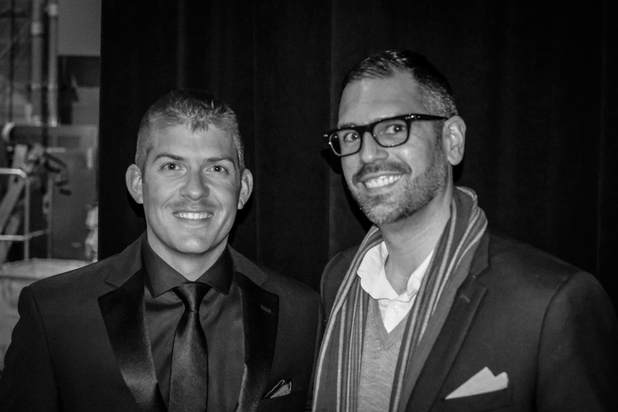 I truly enjoyed every moment of working with Dr. David Thornton and the fantastic MSU Symphony Band throughout October, in preparation for the concert this past Tuesday. The attention to detail and effort to realize my music as I had intended was always present, and I don't know if there is anything more fun than playing with sound in a space like the Wharton Center. Most of all, I was so pleased that many of the musicians took the time to express to me how much they enjoyed the work, or that it meant something special to them. I feel like ASYLUM, while programmatically referring to the Traverse City State Hospital, can also point to the broader scope of mental illnesses, many of which touch our lives everyday. It can be a deeply personal piece for the listener and performer alike, reminding us that while the realities we deal with are sometimes difficult and challenging, there will always be help if we seek it out. I also enjoyed talking music with Dr. Kevin Sedatole and Prof. Gary Green, as well as Branden Steinmetz and many very talented graduate conducting students. Michigan State never ceases to provide opportunities to work with world-class musicians. Go Green! Back to back ASYLUM rehearsals today, first at Okemos HS and then at Michigan State with the Symphony Band and their new director Dr. David Thornton. My dear friend and mentor John Madden had programmed the work prior to his retirement, and I'm so pleased that David liked the piece and invited me to come work with the group today in preparation for the October 24 performance at Wharton. The musicianship of the players in this ensemble is unreal, hyper-nuanced phrasing, very expressive interpretation. It was an absolute honor to have my music performed so well, and especially emotional for me having played in the Symphony Band at MSU 20 years ago. (yikes) It was magic to be back in 120, where I spent so many hours learning from John Madden, Dave Catron and John Whitwell, alongside so many of my good friends and fellow music students. I was overwhelmed with the entire day, and being back on campus where so much of who I am as a musician was encouraged and developed. I even got to grab a coffee with a few of my former Fenton Band students who are currently in the Spartan Marching Band, and I'm so happy that they are having the positively life-changing experience that I had at MSU. If you're in the area on October 24, come out and hear ASYLUM played with incredible passion and beauty.
I'm absolutely thrilled for my music to be performed again by my good friend Mark Stice and his RIDICULOUSLY skilled Symphonic Wind Ensemble at Okemos HS. I got to spend the morning visiting with Mark and his group, hearing them work through the piece, and sharing my motivations behind it. These kids really get it, they were listening intently as I was explaining how Dr. Munson tried to implement the "Beauty is Therapy" philosophy at the Northern Michigan Asylum, and how we can apply that concept not only to the music, but to how we are compassionate to each other in our everyday lives. I'm beyond excited for their performance of ASYLUM at the 2018 Michigan Music Conference in Grand Rapids on January 26th! Thanks again Mark!
It was so much fun to make a trip yesterday to visit Imlay City HS and work with Scott Pries and the Wind Ensemble. A great group of kids and fantastic musicians. We had a wonderful time talking about sonic story-telling, and they really brought the piece to life. Scott is doing an outstanding job with these young musicians, it is thrilling for me to get new ears on this piece every time I hear it programmed by a different ensemble. Congrats and break a leg at the concert next week!
It was my great honor yesterday to have my music (CONSPIRACY THEORIES) programmed alongside Steven Bryant's works at the Western Michigan University Spring Conference on Wind & Percussion Music. THANK YOU to Dave larzelere and the East Lansing HS Symphonic Band for an outstanding performance, and to Scott Boerma for conducting an incredible event. Bravo!
Recently someone asked me if I had seen the 2014 Oscar nominated film “Whiplash” directed by Damien Chazelle. I told them that yes, I had seen it, and that I have a deep, visceral hatred for it. Without fail, people are SHOCKED to learn that I, a musician and music educator, would dislike the film, and they ask me why I so strongly hate it. I am usually equally shocked that they enjoyed it. My hatred is so overwhelming that I am usually inarticulate in my explanation, so here are my calm, cogent thoughts about this movie.
First, I can applaud the aesthetic beauty of the film. The cinematography, color, shot composition, editing, etc. are fantastic and I really enjoyed the immersive way that the ultra-close-ups pull you into the scene, and how the highly stylized lighting and color grading supported the overall characterization of Jazz. Even the performances I can admit were outstanding, J.K. Simmons and Miles Teller have insane chemistry and the tension is legit. Many other aspects of the film as a “film” were also excellent. The root of my hatred is in the writing. The basic premise or “take away” from the film is that (Andrew) the student became a successful musician as a direct result of the fascist, sadistic, and cruel teaching methods of his homophobic, manipulative terrible-person of a teacher (Fletcher). Fletcher yells, demeans, insults, physically slaps his student, throws a chair at him, and uses private details about his students’ personal life to embarrass him publicly. He also psychologically manipulates his student, uses him for his own advance, curses at him, intentionally sets him up to fail, undermines him, coerces him to injure himself, and flat out bullies him. Fletcher is THE WORST TEACHER IN THE HISTORY OF FICTIONAL TEACHERS. He makes the teacher from Willy Wonka & the Chocolate Factory look like a pedagogical genius. Class dismissed. About 30 minutes into the movie I was thinking “oh man, is this going to be INCREDIBLE when this kid (Andrew) finds the courage to stick up for himself, and brings down this colossal ass of a teacher.” I truly thought that was where it was headed; surely this “best picture” nominee couldn’t be as predictable and trite as a “Jazz version” of some cliché sports movie where the “tough coach” pushes the “cocky but gifted” young athlete to achieve greatness… oh wait that’s exactly what happens. Class un-dismissed. One of the most insulting things to watch is how completely incompetent this teacher is. I (or ANY decent music educator) could have solved the “issues” that Andrew was struggling with in about five minutes. Want to play faster right now? Lower your stick heights, play quieter, make smaller movements. Want to play faster later? Use your metronome, go slow, adjust your grip/technique, gradually speed up and stop trying to be Buddy Rich. Etc. Etc. Notice the lack of physical violence or chair throwing. Fletcher’s “teaching techniques” exist because he has no pedagogical skills, no tools in his toolbox, no patience, no empathy, and no love for people or music. He’s basically a sociopath, using people to get what he wants, even pretending to have emotions (when he learns of the death of a former student) to trick his students into thinking that he cares about them. Again, if all of this character development was done to setup the premise that Fletcher was a horrible person and terrible teacher, then I think it could have been a spectacular moment when Andrew has a musical triumph or breakthrough (as result of his own hard-work) and demonstrates to everyone that he achieved IN SPITE of his abusive teacher. Paradoxically, when Andrew has his big musical breakthrough, it is portrayed as justification for all of the horrible abuse he went through, validating Fletcher’s behavior. Class re-dismissed. OK so he’s a terrible teacher and a bad person. Does that make it a “bad movie?” No. What makes it a bad movie is that it disrespects music educators. It demeans us. It reduces what we love, what we have devoted our lives to, down to bullying. And it says that not only is that OK, but that’s how you get it done at the highest levels. It’s BS. It is deeply false to suggest that artistic greatness is achieved through fear or coercion. It is equally false that students who are terrified of their teachers can somehow grow into the best versions of themselves. Every effective teacher knows that students can only learn in an environment that is comfortable and controlled. The kind of motivation that leads to greatness is INTRINSIC, and cannot extrinsically come out of fear. Andrew is intrinsically motivated, he WANTS to be great. NOTHING that Fletcher does helps Andrew achieve. I would NEVER behave in this way, not only because I would get fired and likely sued, but because it just DOESN’T WORK. Ever. Even if it did work, nobody would want to join my band because ensemble music is about people, and playing TOGETHER, and the joy of working toward a common goal. It is about creativity and expression, NOT fear. To grow, you must make failure your friend, and learn from it, not live in terror of making a mistake. Especially in Jazz, where improvisation is central to the art form! The students in Fletcher’s Jazz Band are terrified. They take NO RISKS, show NO JOY, NO CREATIVITY. They are basically machines, who play like robots programmed by their control freak professor. Watch two minutes of any rehearsal at any top university or conservatory. You will see empathy, humanity, self-discipline (not totalitarianism), enthusiasm, determination, and joy. You will see respected (not feared) teachers helping (intrinsically) motivated students to achieve greatness. You won’t see chairs flying, vulgar insulting language and most certainly you won’t see blood. I have been lucky enough to have been the student of many of these outstanding educators, and never once did they demean me or put me down. They often challenged me, and pushed me through encouragement or by reminding me how very capable I was, but never ever tried to manipulate me or use my talent and energy for their gain. I think that I could have LOVED this movie. I think I could have argued that it was one of the best “music” movies that had even been made… if, at the “big competition” (which is also BS), right when Andrew realized that Fletcher was trying to screw him yet again by calling a chart he was unprepared to play, Andrew stood up, dropped his sticks and walked out. And the whole band followed. Because how you treat people will always be more important than achieving “greatness.” So yes, I hated "Whiplash," because when you love something like making music with people, and devote your life to it, and anything (a movie, a person, a secretary of education) insults what you love, it bothers you. Yesterday I had the honor of guest conducting the East Lansing HS Symphonic Band, under the direction of my good friend Dave Larzelere. This incredible group of young musicians will be premiering the piece in April at the Western Michigan University Spring Conference for Winds & Percussion, and I got to spend some time in rehearsal yesterday fine tuning the piece. They really are an exceptional ensemble across the board, with a particularly creative percussion section. Thanks for all of your hard work and hospitality! I'm excited for April 13!
This essay was written by Karl Paulnack, the Music Department head at Boston Conservatory, based on his speech that he gives to the parents of incoming freshman. I’m posting it here for my own reference, and to so that I may easily these brilliant thoughts about music, and share them often:
“One of my parents’ deepest fears, I suspect, is that society would not properly value me as a musician, that I wouldn’t be appreciated. I had very good grades in high school, I was good in science and math, and they imagined that as a doctor or a research chemist or an engineer, I might be more appreciated than I would be as a musician. I still remember my mother’s remark when I announced my decision to apply to music school—she said, “you’re WASTING your SAT scores.” On some level, I think, my parents were not sure themselves what the value of music was, what its purpose was. And they LOVED music, they listened to classical music all the time. They just weren’t really clear about its function. So let me talk about that a little bit, because we live in a society that puts music in the “arts and entertainment” section of the newspaper, and serious music, the kind your kids are about to engage in, has absolutely nothing whatsoever to do with entertainment, in fact it’s the opposite of entertainment. Let me talk a little bit about music, and how it works. The first people to understand how music really works were the ancient Greeks. And this is going to fascinate you; the Greeks said that music and astronomy were two sides of the same coin. Astronomy was seen as the study of relationships between observable, permanent, external objects, and music was seen as the study of relationships between invisible, internal, hidden objects. Music has a way of finding the big, invisible moving pieces inside our hearts and souls and helping us figure out the position of things inside us. Let me give you some examples of how this works. One of the most profound musical compositions of all time is the Quartet for the End of Time written by French composer Olivier Messiaen in 1940. Messiaen was 31 years old when France entered the war against Nazi Germany. He was captured by the Germans in June of 1940, sent across Germany in a cattle car and imprisoned in a concentration camp. He was fortunate to find a sympathetic prison guard who gave him paper and a place to compose. There were three other musicians in the camp, a cellist, a violinist, and a clarinetist, and Messiaen wrote his quartet with these specific players in mind. It was performed in January 1941 for four thousand prisoners and guards in the prison camp. Today it is one of the most famous masterworks in the repertoire. Given what we have since learned about life in the concentration camps, why would anyone in his right mind waste time and energy writing or playing music? There was barely enough energy on a good day to find food and water, to avoid a beating, to stay warm, to escape torture—why would anyone bother with music? And yet—from the camps, we have poetry, we have music, we have visual art; it wasn’t just this one fanatic Messiaen; many, many people created art. Why? Well, in a place where people are only focused on survival, on the bare necessities, the obvious conclusion is that art must be, somehow, essential for life. The camps were without money, without hope, without commerce, without recreation, without basic respect, but they were not without art. Art is part of survival; art is part of the human spirit, an unquenchable expression of who we are. Art is one of the ways in which we say, “I am alive, and my life has meaning.” On September 12, 2001 I was a resident of Manhattan. That morning I reached a new understanding of my art and its relationship to the world. I sat down at the piano that morning at 10 AM to practice as was my daily routine; I did it by force of habit, without thinking about it. I lifted the cover on the keyboard, and opened my music, and put my hands on the keys and took my hands off the keys. And I sat there and thought, does this even matter? Isn’t this completely irrelevant? Playing the piano right now, given what happened in this city yesterday, seems silly, absurd, irreverent, pointless. Why am I here? What place has a musician in this moment in time? Who needs a piano player right now? I was completely lost. And then I, along with the rest of New York, went through the journey of getting through that week. I did not play the piano that day, and in fact I contemplated briefly whether I would ever want to play the piano again. And then I observed how we got through the day. At least in my neighborhood, we didn’t shoot hoops or play Scrabble. We didn’t play cards to pass the time, we didn’t watch TV, we didn’t shop, we most certainly did not go to the mall. The first organized activity that I saw in New York, that same day, was singing. People sang. People sang around fire houses, people sang “We Shall Overcome”. Lots of people sang America the Beautiful. The first organized public event that I remember was the Brahms Requiem, later that week, at Lincoln Center, with the New York Philharmonic. The first organized public expression of grief, our first communal response to that historic event, was a concert. That was the beginning of a sense that life might go on. The US Military secured the airspace, but recovery was led by the arts, and by music in particular, that very night. From these two experiences, I have come to understand that music is not part of “arts and entertainment” as the newspaper section would have us believe. It’s not a luxury, a lavish thing that we fund from leftovers of our budgets, not a plaything or an amusement or a pass time. Music is a basic need of human survival. Music is one of the ways we make sense of our lives, one of the ways in which we express feelings when we have no words, a way for us to understand things with our hearts when we can’t with our minds. Some of you may know Samuel Barber’s heart-wrenchingly beautiful piece Adagio for Strings. If you don’t know it by that name, then some of you may know it as the background music which accompanied the Oliver Stone movie Platoon, a film about the Vietnam War. If you know that piece of music either way, you know it has the ability to crack your heart open like a walnut; it can make you cry over sadness you didn’t know you had. Music can slip beneath our conscious reality to get at what’s really going on inside us the way a good therapist does. I bet that you have never been to a wedding where there was absolutely no music. There might have been only a little music, there might have been some really bad music, but I bet you there was some music. And something very predictable happens at weddings—people get all pent up with all kinds of emotions, and then there’s some musical moment where the action of the wedding stops and someone sings or plays the flute or something. And even if the music is lame, even if the quality isn’t good, predictably 30 or 40 percent of the people who are going to cry at a wedding cry a couple of moments after the music starts. Why? The Greeks. Music allows us to move around those big invisible pieces of ourselves and rearrange our insides so that we can express what we feel even when we can’t talk about it. Can you imagine watching Indiana Jones or Superman or Star Wars with the dialogue but no music? What is it about the music swelling up at just the right moment in ET so that all the softies in the audience start crying at exactly the same moment? I guarantee you if you showed the movie with the music stripped out, it wouldn’t happen that way. The Greeks: Music is the understanding of the relationship bet ween invisible internal objects. I’ll give you one more example, the story of the most important concert of my life. I must tell you I have played a little less than a thousand concerts in my life so far. I have played in places that I thought were important. I like playing in Carnegie Hall; I enjoyed playing in Paris; it made me very happy to please the critics in St. Petersburg. I have played for people I thought were important; music critics of major newspapers, foreign heads of state. The most important concert of my entire life took place in a nursing home in Fargo, ND, about 4 years ago. I was playing with a very dear friend of mine who is a violinist. We began, as we often do, with Aaron Copland’s Sonata, which was written during World War II and dedicated to a young friend of Copland’s, a young pilot who was shot down during the war. Now we often talk to our audiences about the pieces we are going to play rather than providing them with written program notes. But in this case, because we began the concert with this piece, we decided to talk about the piece later in the program and to just come out and play the music without explanation. Midway through the piece, an elderly man seated in a wheelchair near the front of the concert hall began to weep. This man, whom I later met, was clearly a soldier—even in his 70’s, it was clear from his buzz-cut hair, square jaw and general demeanor that he had spent a good deal of his life in the military. I thought it a little bit odd that someone would be moved to tears by that particular movement of that particular piece, but it wasn’t the first time I’ve heard crying in a concert and we went on with the concert and finished the piece. When we came out to play the next piece on the program, we decided to talk about both the first and second pieces, and we described the circumstances in which the Copland was written and mentioned its dedication to a downed pilot. The man in the front of the audience became so disturbed that he had to leave the auditorium. I honestly figured that we would not see him again, but he did come backstage afterwards, tears and all, to explain himself. What he told us was this: “During World War II, I was a pilot, and I was in an aerial combat situation where one of my team’s planes was hit. I watched my friend bail out, and watched his parachute open, but the Japanese planes which had engaged us returned and machine gunned across the parachute chords so as to separate the parachute from the pilot, and I watched my friend drop away into the ocean, realizing that he was lost. I have not thought about this for many years, but during that first piece of music you played, this memory returned to me so vividly that it was as though I was reliving it. I didn’t understand why this was happening, why now, but then when you came out to explain that this piece of music was written to commemorate a lost pilot, it was a little more than I could handle. How does the music do that? How did it find those feelings and those memories in me?” Remember the Greeks: music is the study of invisible relationships between internal objects. This concert in Fargo was the most important work I have ever done. For me to play for this old soldier and help him connect, somehow, with Aaron Copland, and to connect their memories of their lost friends, to help him remember and mourn his friend, this is my work. This is why music matters. What follows is part of the talk I will give to this year’s freshman class when I welcome them a few days from now. The responsibility I will charge your sons and daughters with is this: “If we were a medical school, and you were here as a med student practicing appendectomies, you’d take your work very seriously because you would imagine that some night at two AM someone is going to waltz into your emergency room and you’re going to have to save their life. Well, my friends, someday at 8 PM someone is going to walk into your concert hall and bring you a mind that is confused, a heart that is overwhelmed, a soul that is weary. Whether they go out whole again will depend partly on how well you do your craft. You’re not here to become an entertainer, and you don’t have to sell yourself. The truth is you don’t have anything to sell; being a musician isn’t about dispensing a product, like selling used Chevys. I’m not an entertainer; I’m a lot closer to a paramedic, a firefighter, a rescue worker. You’re here to become a sort of therapist for the human soul, a spiritual version of a chiropractor, physical therapist, someone who works with our insides to see if they get things to line up, to see if we can come into harmony with ourselves and be healthy and happy and well. Frankly, ladies and gentlemen, I expect you not only to master music; I expect you to save the planet. If there is a future wave of wellness on this planet, of harmony, of peace, of an end to war, of mutual understanding, of equality, of fairness, I don’t expect it will come from a government, a military force or a corporation. I no longer even expect it to come from the religions of the world, which together seem to have brought us as much war as they have peace. If there is a future of peace for humankind, if there is to be an understanding of how these invisible, internal things should fit together, I expect it will come from the artists, because that’s what we do. As in the concentration camp and the evening of 9/11, the artists are the ones who might be able to help us with our internal, invisible lives.” A bit late on this post... I recently had the great pleasure guest conducting the Bloomfield Hills HS band in preparation for their performance of ALCATRAZ. A great program under the newly appointed direction of Alan Posner, the ensemble was great to work with, and clearly takes they music making seriously. Although I wasn't able to make the performance (it was excellent), I had a great time making music and hearing different interpretations. Thanks again to Alan Posner and the group for their hard work on my piece, I look forward to collaborating again with this wonderful director and ensemble.
Local photographer and journalist Tim Jagielo covered the Gala and wrote an excellent article for the Times. He also put together this fantastic video, CLICK HERE for the article. What an incredible experience it has been to hear my music performed with such excellence and with so much passion. Every detail of the weekend was executed to near perfection by a huge crew of musicians, volunteers and committee members. I cannot possibly imagine a more perfect realization of the vision I had for this unique cultural event, and I am deeply indebted to everyone who made this possible. I am particularly thankful for the profound support of our Executive Director Jennifer Fleck and to my incredible wife Natalie Perkins for co-chairing the Red Carpet Gala committee. You've taken my fanciful dreams and made them manifest. Colin Campbell, thank you for delivering a seamless visual presentation of the film, and thank you Logan Ganter for running sound and mixing on the fly. Thank you to John Strayer and our our event sponsors, to Tim Martuch for music prep, to Brad Wright for all of the equipment, to Greg Fleck for everything, to Stan Matthewson for pulling the trailer, to Dan & Lori Thompson for technical help, to the FCO board for their support, to all the individuals who contributed a piece of the magnificent puzzle, and most of all to the FCO for sharing my dream. I'm completely overwhelmed with the support and success. Regarding the New Score, I feel as though the members of the Fenton Community Orchestra elevated the music to the level of the original film. So many audience members shared with me how many times throughout the shows they forgot that the music was live, and not coming from the movie. It is the confluence of preparation, execution and passion that brought it all together. We can never know what Alfred Hitchcock may have thought about the music, or what Bernard Herrmann would have written if asked, but I don't think it matters. This was a case of art inspiring art, and it happened exactly as I imagined. It was magic. The profound success of this event suggests that we may perform it again sometime in the future... ...but for now I'm going to go sleep for a week. Show week is finally here! Hundreds and hundreds of hours by many wonderful musicians and volunteers have been leading up to this week, and I couldn't be more excited about the premiere of my original score for Alfred Hitchcock's 1963 masterpiece. Both shows are SOLD OUT with waiting lists, and even if we have to dig through snow to put this thing together, it's happening. THE BIRDS are coming!
The Fenton Community Orchestra will premiere my original score to Alfred Hitchcock's "The Birds" at a special red carpet gala event this February 27, 2016 at the recently renovated and expanded Fenton Cultural & Community Center. This will not only be a unique cultural and arts event, but fundraiser for the orchestra as well. CLICK HERE FOR TICKETS! This project has been a long time coming, beginning in the summer of 2013 when Nat and I took a trip to California. (read about it here.) It will be the result of collaboration with FCO Executive Director Jennifer Fleck, my wife Natalie (The Birds Gala committee Co-Chair), John Strayer of the Fenton Film Series (and Tanglewood Homecare Sponsor), Gerych's of Fenton (Sponsor), the Fenton Cultural & Community Center (Sponsor), the Lakes Area Arts Council, as well as countless others who have joined my vision for this event. I could not possibly be more excited for this event, please consider coming out to this special event!
This morning I got to work with the Okemos HS Freshman Band on ALCATRAZ. What a fantastic ensemble! I was completely blown away by their musicianship, professionalism and maturity. HUGE kudos to Mark Stice and Kevin Culling for preparing these musicians, they absolutely nailed the piece. I also had the pleasure of hearing the OHS Wind Ensemble rehearse Bernstein's "SLAVA!", Whitacre's "Lux Arumque", and Mackey's "Xerxes." They crushed them all. I had a hard time believing that these students were actually high school students at some point. Technical chops abound. I haven't been back to Okemos since I student taught with Jim Barry in 2002. Some things have obviously changed but the commitment to outstanding music education hasn't. Visiting other ensembles and getting to work with musicians from around the state/country/planet is part of what makes being a music educator and composer so fulfilling.
I had the great pleasure of guest conducting the Berkley HS Symphonic Band in a rehearsal of ALCATRAZ this morning. Alan Posner & Natalie Pagel did a wonderful job preparing the group and they were fantastic. There are some really talented players in the ensemble and it was very satisfying to hear the low reed/double reed/brass players fill out the thick scoring in the low register. Great work from the soloists too, and four horn players that I'm totally impressed with.
I'm looking forward to the US premiere of ALCATRAZ on Tuesday, May 5, 2015 at 7pm in the Berkley HS Auditorium. (Jeune Orchestre de Limonest performed the international premiere in March) In early January of this year, my friend and colleague Jim Schuster, Director of bands at Davison HS approached me about commissioning a new work for band and chorus. A former student of his had recently passed away and he wanted to honor his memory with a piece that would celebrate his life. I was honored to create this work to serve as a living memorial for Chandler Wolfgang Anschutz. The greatest challenge for me was to try to get an understanding of who this young man was, and what his character was like. Through conversations and letters, Jim and his students, as well as Jennifer Orkisz (Davison Choir Director) and her students explained to me how Chandler was the kind of kid who made an impression on those around him, and wasn’t one to sit back and watch life happen in front of him. He was active in the band, choir and theater programs at Davison and was the type of person who made everyone laugh. He was chivalrous and kind, playful and confidant, generous and honest. He was a very loyal and dear friend to many, and they knew that he cared for them. He was also a complex human being who struggled with his health and place in life. I wanted to find a way to express the many colors and facets of his personality. While I was thinking about how to aurally represent his youth and spirit, I was reminded of the many students I’ve had over the years who shared some of Chandlers personality traits. The idea of “dancing through life” kept reoccurring to me, and it felt connected somehow. I also thought that an odd meter dance would be appropriate, as odd meters tend to “stand out” and draw attention to themselves because of their idiosyncratic nature, much like Chandler did. My immediate thought was of a piece I had written years ago, when I was nineteen, for Trombone and Piano. Odd-meter, fast, dance-like. Chandler played the Trombone (of course he did) and was about the same age when he passed, so this also felt connected. I considered adapting this Trombone & Piano concerto for band, but it eventually served only as inspiration for the final work, as the concerto was much too difficult and complex, and ultimately, it wasn’t about Chandler’s youth, but rather mine. While researching odd meter dances and idioms, I came across a turn of phrase that resonated with me profoundly... To "trip the light fantastic" is to dance nimbly or lightly, or to move in a pattern to musical accompaniment, often used in a humorous vein. Grammatically, it is an example of a constructionally idiosyncratic idiom, in that it is impossible to construct a meaningful literal-scene from the formal structure of the phrase. This phrase evolved through a series of usages and references, typically attributed to John Milton's 1645 poem L'Allegro, which includes the lines: "Come, and trip it as ye go / On the light fantastic toe." The imagery of tripping on toes also appears in Shakespeare's The Tempest: "Before you can say come, and goe, / And breathe twice; and cry, so, so: / Each one tripping on his Toe, / Will be here with mop, and mowe." I knew that Jim wanted to include chorus in the work, both to honor Chandler’s involvement in choir, as well as for musical effect, and these lyrics were screaming at me to be used. I explored the Milton poem further, and fell in love with it. "L'Allegro" is a lyric poem centering on the joy of taking part in the delights of a spring day, including those provided by nature in a pastoral setting and those provided by the theater in an urban setting. The title is an Italian word that originally meant "the cheerful man." The poem was published in London in 1645, so the language is just beautiful. The speaker orders Melancholy from his life, telling it to find a dwelling place among the Cimmerians—people who live in a land of unending darkness. At the same time, he invites a goddess of joy, Euphrosyne, to bring him mirth on the dawning of a new spring day as the song of the lark and the din of a rooster chase the last of the darkness away. I chose some of my favorite verses that seemed to reflect how Chandler lived his life: “Come, and trip it as ye go, On the light fantastic toe, Young and old come forth to play, On a sunshine holiday, Sights as youthful poets dream, Summer eves by haunted stream, Rob’d in flames of amber light, Clouds in thousand liveries dight, These delights if thou canst give, Mirth, with thee I mean to live!” The iambic tetrameter of the lines worked perfectly with the odd meter dance I heard in my head, and the imagery was just spectacular. My sincere hope is that this work can honor Chandler’s life, and offer a tiny glimpse into the infinite wonder that I believe he is now one with. (Click here to preview the score) Our wonderful friends from the Conservatoire de Limonest (near Lyon, France) visited us yesterday for a day of music, friendship, food and drink. These people are some of the kindest, warmest, and most talented that I've ever had the pleasure to meet, and it is always a wonderful experience to spend time with them. The next visit can't come soon enough.
Canon 6D, 24-105 STM, Adobe Lr 5 I've begun work on an orchestral score to Alfred Hitchcock's "The Birds." The plan right now is to write through the winter, present the music to the orchestra in the spring so they can work it up over the summer, and then rehearse in the fall for a late October live performance with the film at the newly renovated Fenton Community Center. John Strayer from the Fenton Film series is enthusiastic about making this all work, so I'm optimistic. The inception of this project was sparked by an old concert poster that I happened upon while traveling through California in the summer of 2013. Natalie and I were driving up the Pacific Coast Highway to San Francisco and spent a few days exploring the beautiful area of Big Sur. One of the many cool and unique spots was the Henry Miller Memorial Library, which lives in a tiny wood shack of a building, just off the winding, curving two lane road that clings to the cliffs. Inside this tiny, musty cabin were myriad old books, movie posters, concert flyers, vinyl records, books, bizarre pieces of art dangling from the ceiling, broken instruments, one-eyed cats, and hippies. It was like a bubble of space-time frozen in the 1960's. On the ceiling in one corner of the library was a flyer for a concert, a live performance by Philip Glass and his ensemble performing his original 1988 score to the 1931 Dracula film starring Bela Lugosi. I LOVED the idea of a modern composer writing and performing music in a live setting while the classic film was projected above. This seed grew in my mind as we continued our trip up the coast. As we were vacationing in San Francisco, I was enjoying seeing in person many of my favorite film locations around the peninsula. When we were in Union Square, I recognized the opening shot of Alfred Hitchcock's "The Birds" and remembered that the film was entirely void of musical underscore in lieu of an experimental sound design. I mentioned the idea of writing and performing a live score to the film to Natalie, who was profoundly enthusiastic about the idea. A few days later we visited Alcatraz Island, and I was completely fascinated and inspired, so writing ALCATRAZ bumped THE BIRDS to the back burner. While I completely respect and admire Hitchcock & Herrmann's experimental decision not to score the film, to a composer, it begs to have music set to it. While Philip Glass' score for Dracula was written his his own style, I've been writing this score strictly using the tonalities, conventions and idioms of Bernard Herrmann. I admire his music at the deepest level. It has been a profound influence on my musical development and a chance to step into his shoes (so to speak) and write in his style is both a fantastic challenge and simply plain fun. It reminds me of how I used to play make-believe as a kid, putting on costumes and pretending to be someone else for a while. Pretending to be Bernard Herrmann is the best kind of make-believe.
I'm sure there will be purists who disagree with the whole idea of this, maintaining that the film and it's soundtrack are sacrosanct. I'm not arguing otherwise. I'm doing this for the fun of it, to see what it maybe would have been like if Herrmann had insisted on scoring it. Hitchcock has been known to have himself wondered how a musical score from Herrmann would have played, so I don't think its quite blasphemy mess with it. More to come... At this point ALCATRAZ is about 95% composed, in Logic. I'm trying to find the right harmonic signature for the "escape" sequence and finale, expressing both the victory of escape from the viewpoint of the prisoners, as well as the panic and fear of the guards and city of San Francisco upon discovering their escape. The June 1962 Alcatraz escape was an attempt by American criminals Clarence Anglin, John Anglin and Frank Morris to leave Alcatraz Federal Penitentiary on Alcatraz Island using an inflatable raft. The FBI's investigation was unable to determine whether the three men successfully escaped or died in the attempt... I'm leaning in favor of the prisoners right now... kind of implying that I believe they survived the frigid waters and current. I want to end with a ? regarding their ultimate fate, as nobody knows if they made it to shore or if they succumbed to the sea.
Natalie and I toured the island in July of 2013, at the end of a two week trip to the California coast. We flew into Los Angeles and spent some time visiting our good friend Tim Brandt, then made our way down to San Clemente to stay with Mike & Rachel Bruchanski before we drove up the PCH through Santa Barbara to San Luis Obispo, Big Sur and finally, San Francisco. The Alcatraz Island and the stories it told absolutely fascinated me. Over a year later, this piece is the result of mulling over those fascinations. When I'm finished composing I will transcribe by phrase directly into Sibelius. This has been my general practice, to write in Logic where I can hear the voices with virtual instruments, expression, dynamics, etc. and then take dictation in Sibelius. Slow but accurate. I feel like this piece is a suite from the score to the Alcatraz movie that Alfred Hitchcock never made, and Bernard Herrmann never scored... I fell into using the half-diminished chord extensively, it was one of Herrmann's favorites, and some of the cascading, descending seventh chords feel very much in that wheelhouse. |


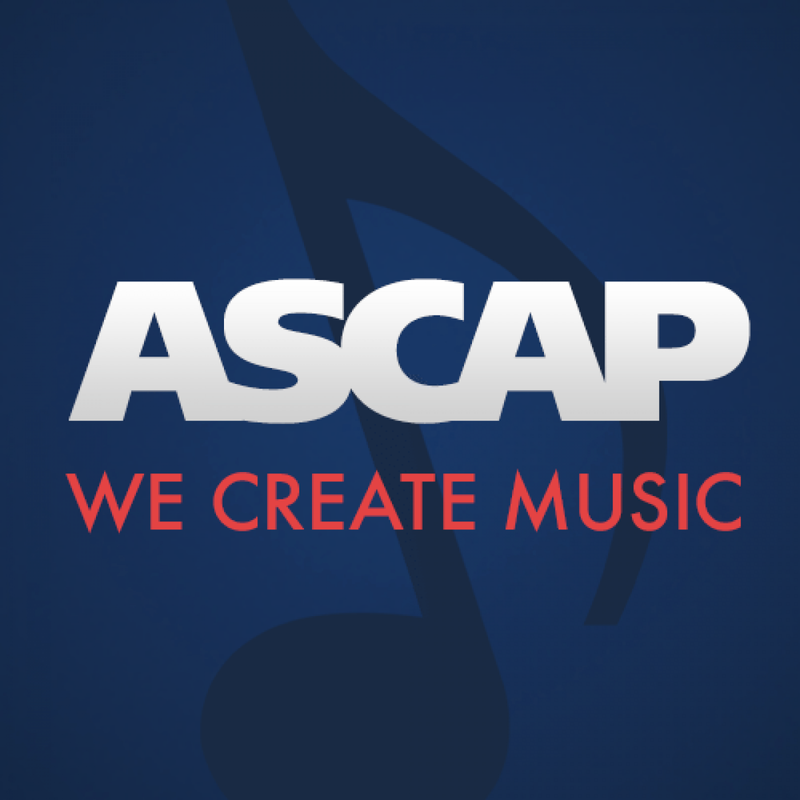
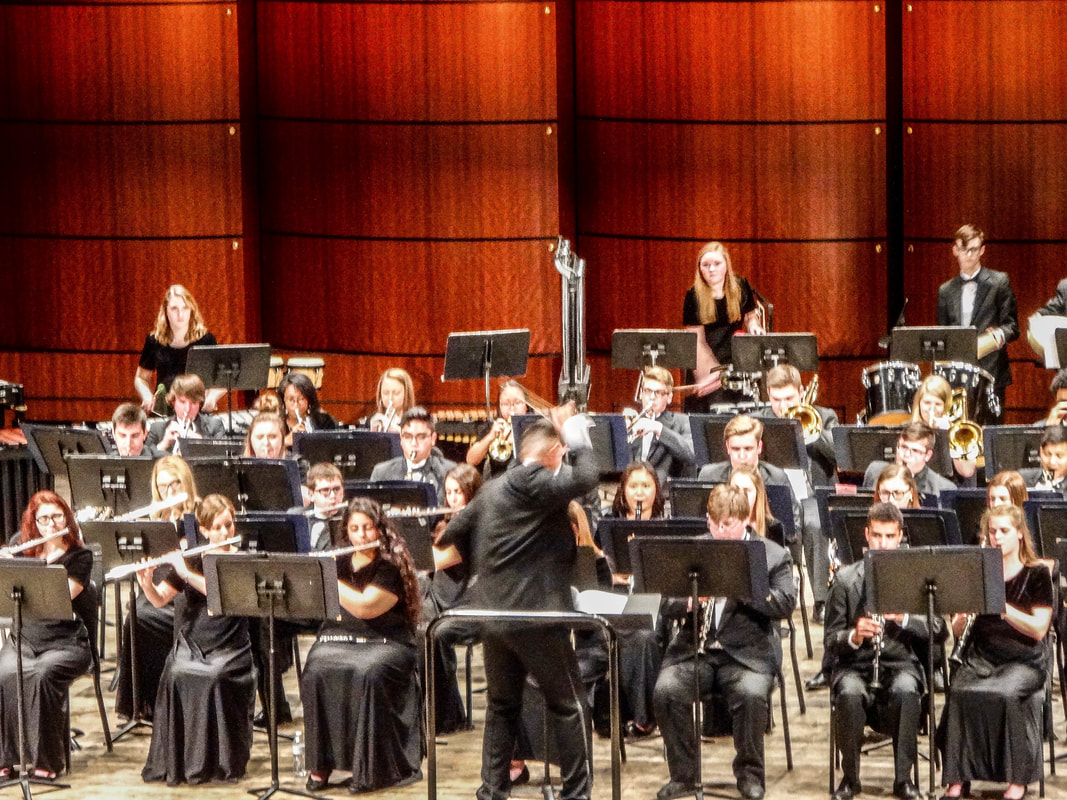
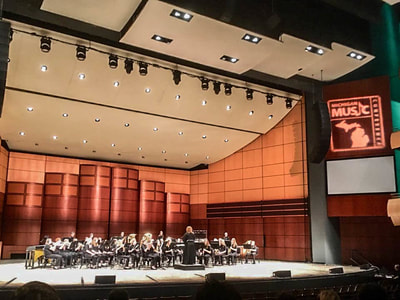
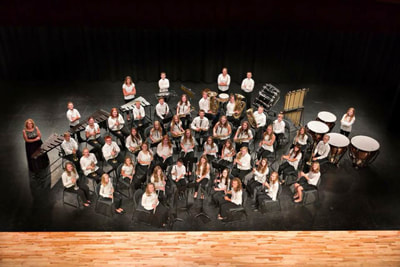
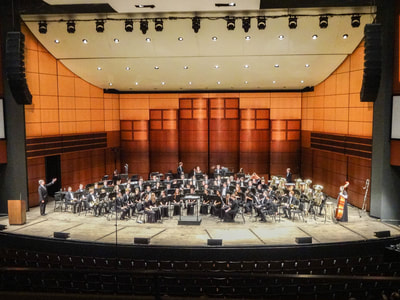
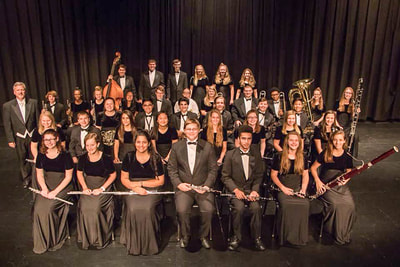
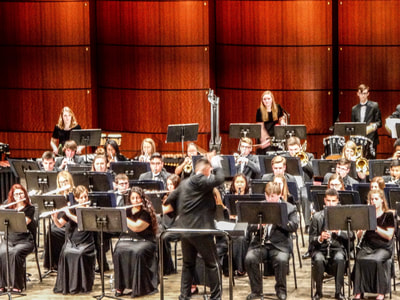
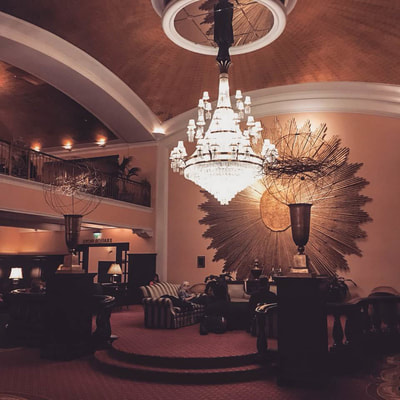
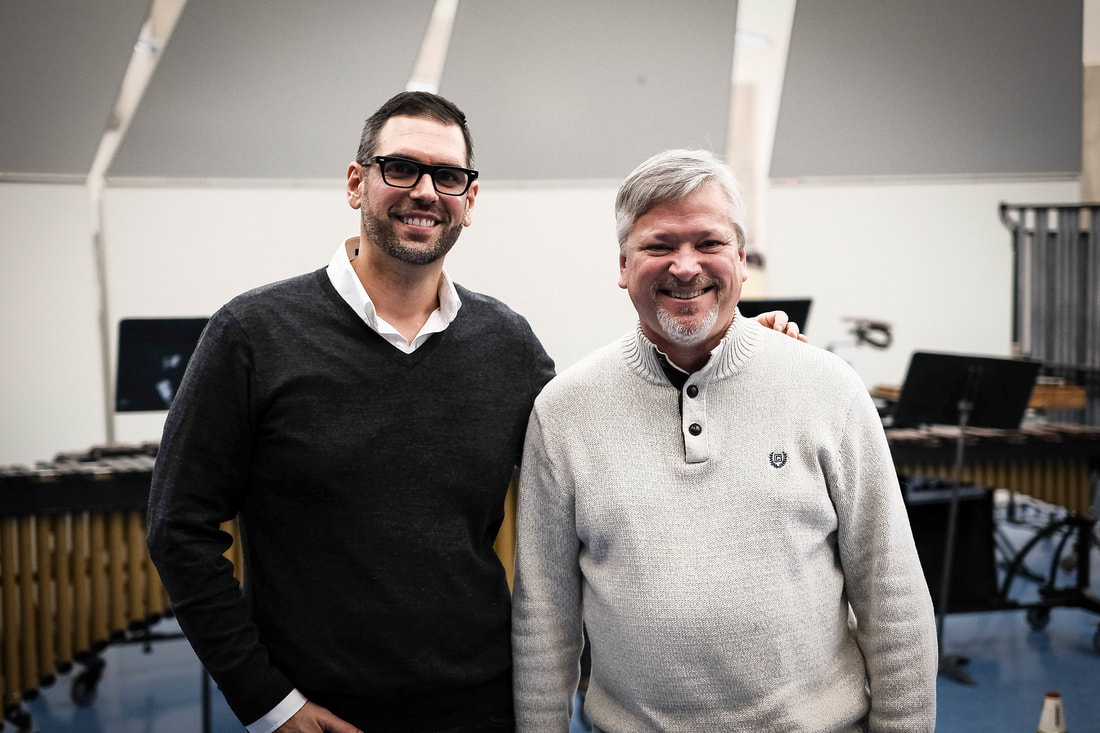
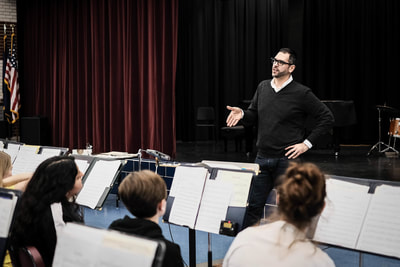
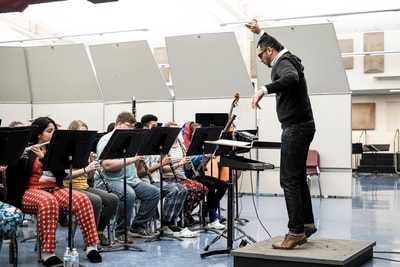
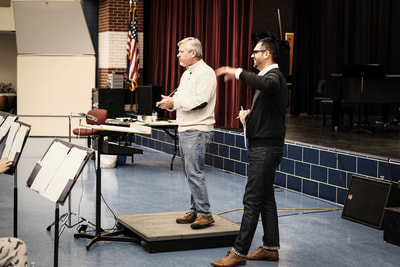
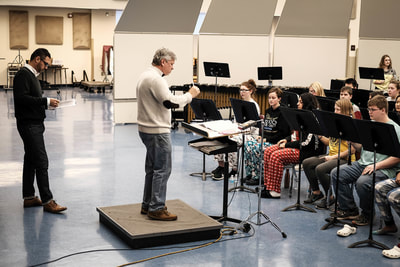
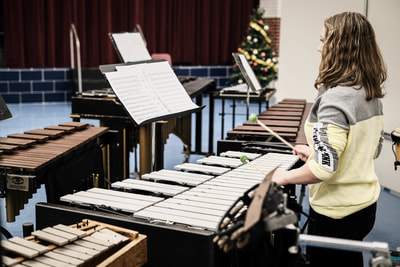
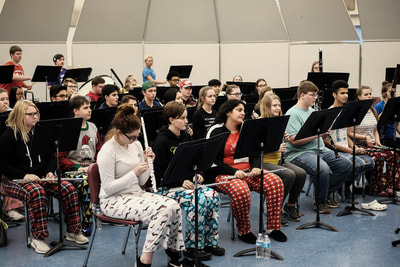
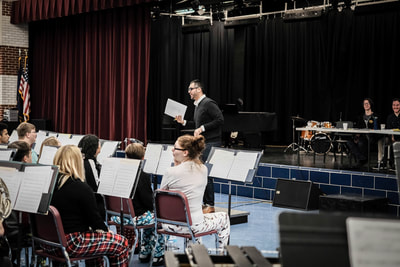
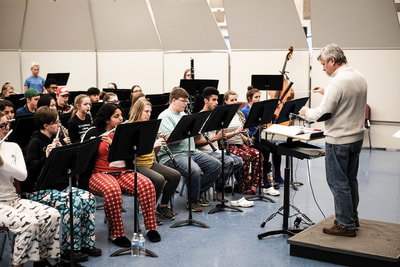
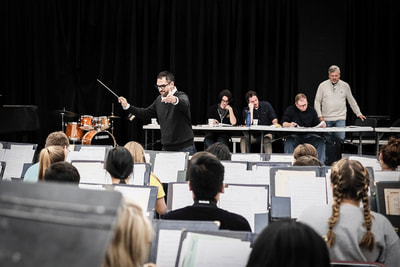
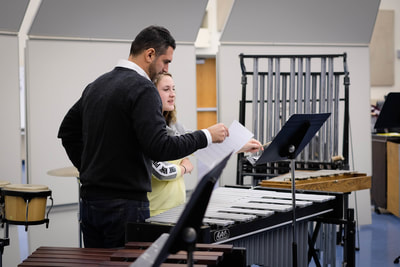
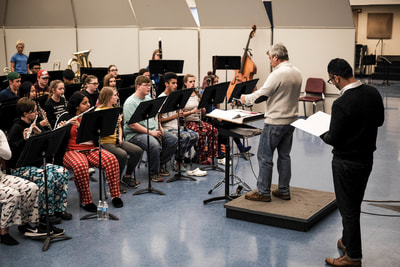
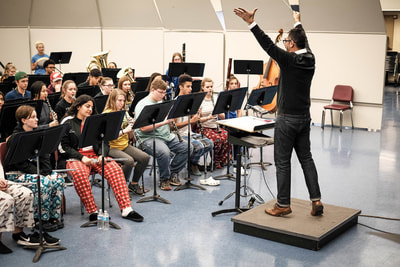
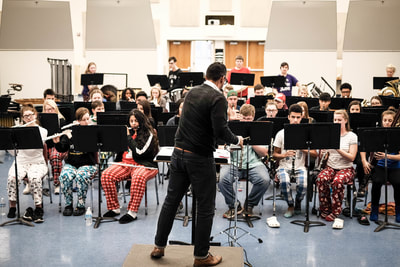
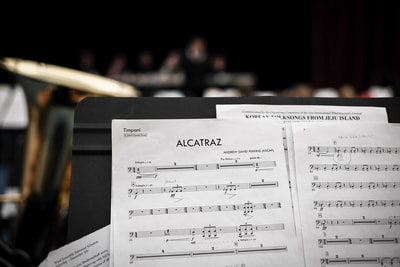
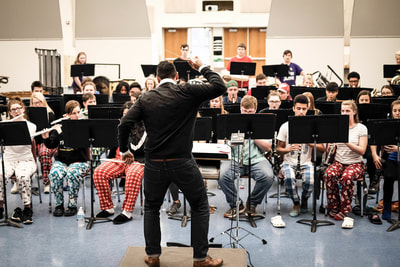
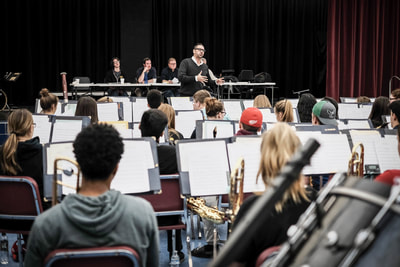
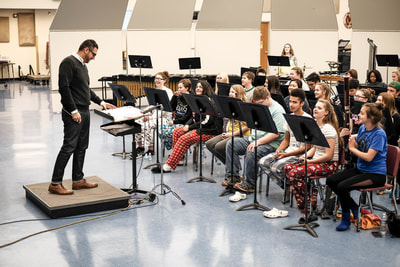
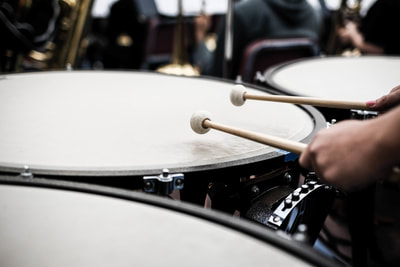
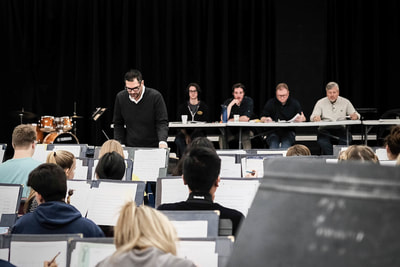
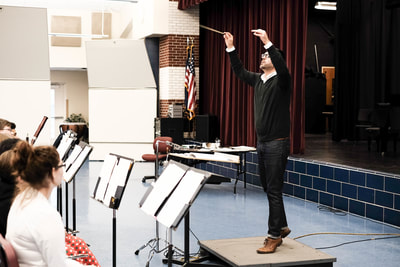
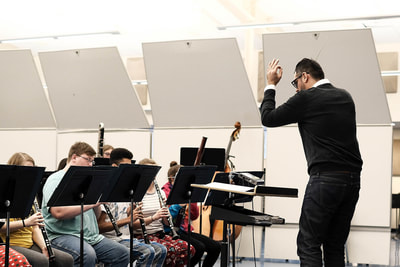
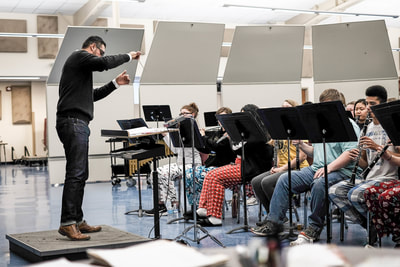
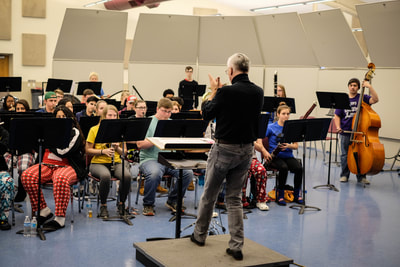
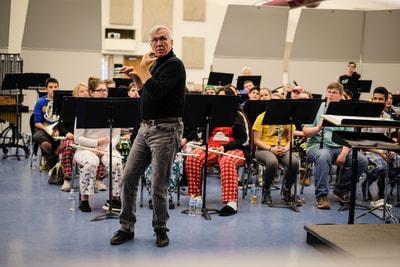
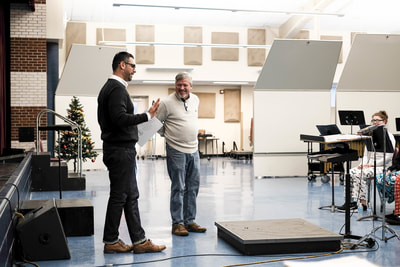
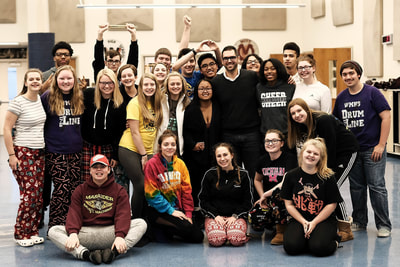
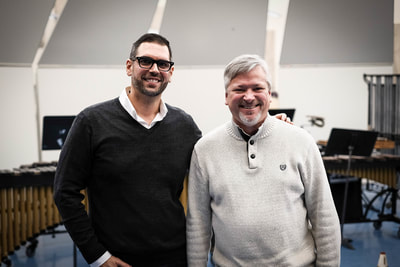
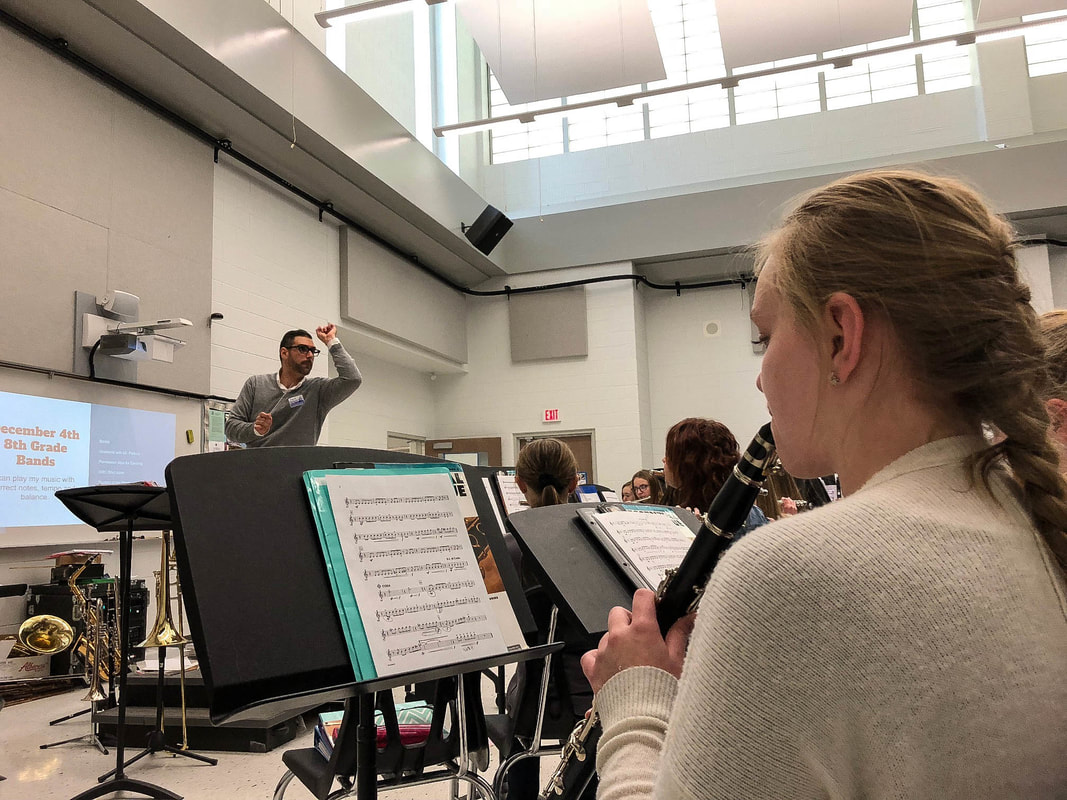
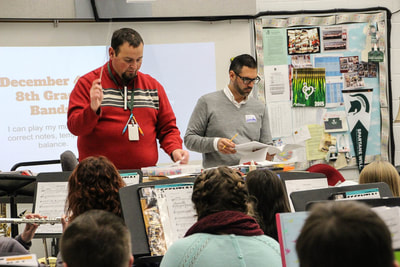
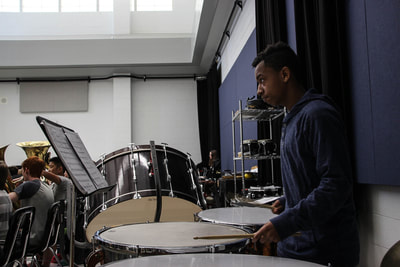
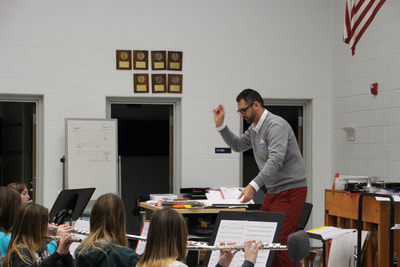
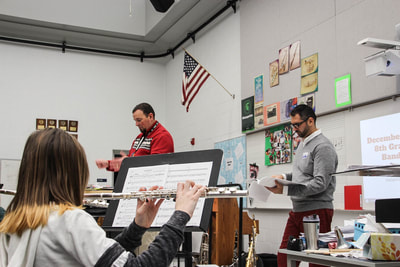
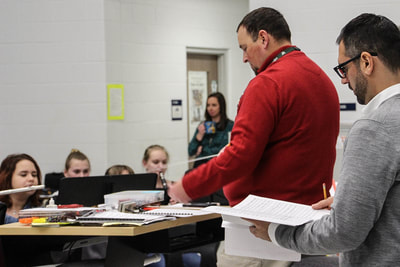
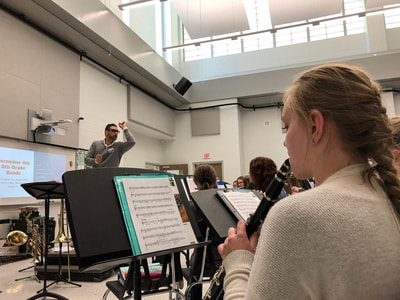
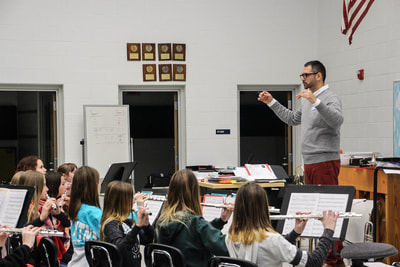
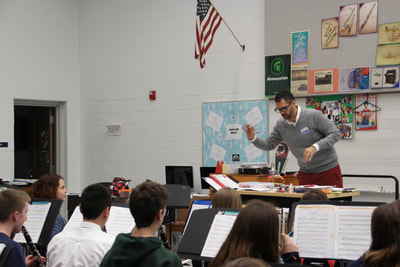
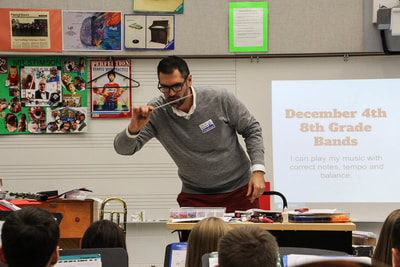
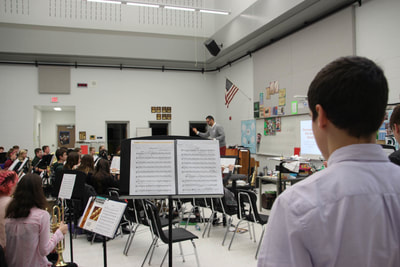
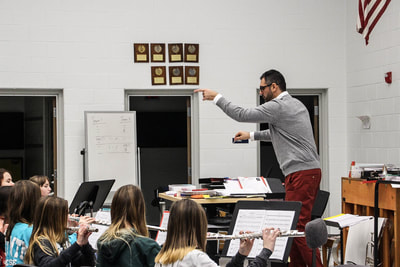
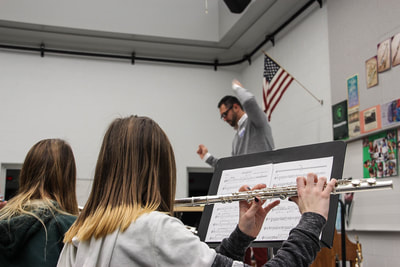
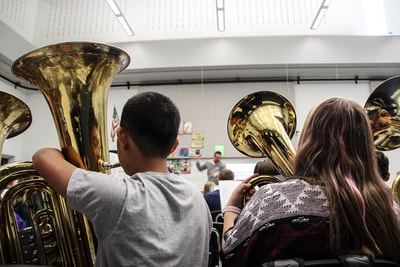
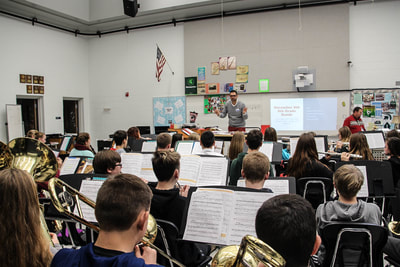
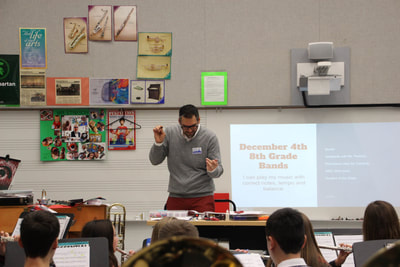
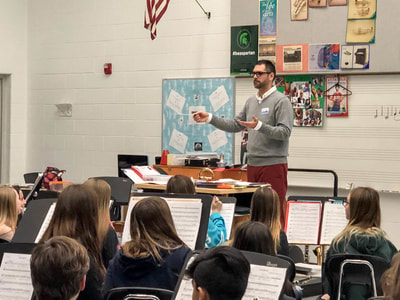
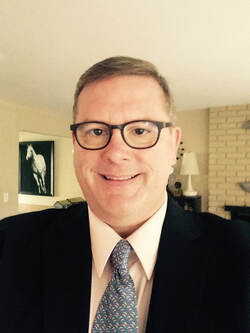
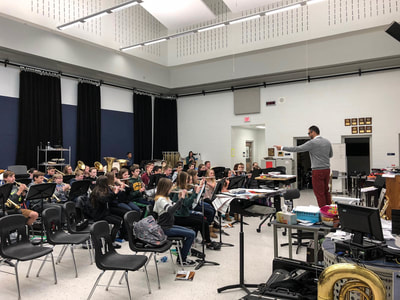
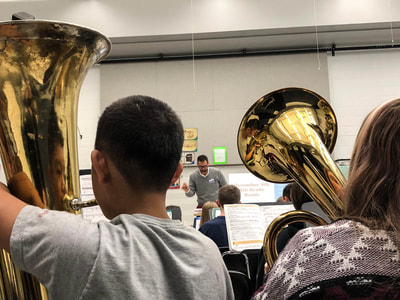
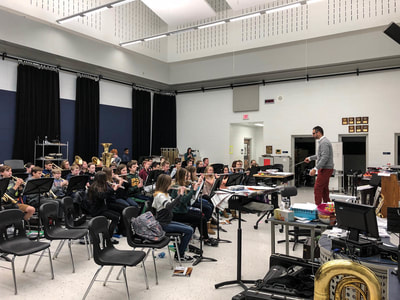
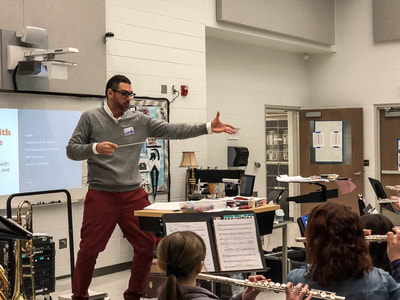
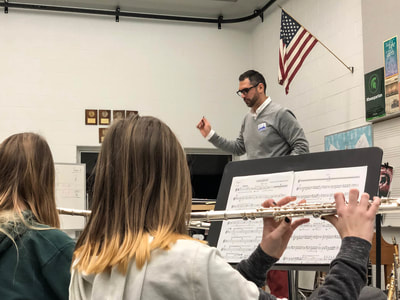
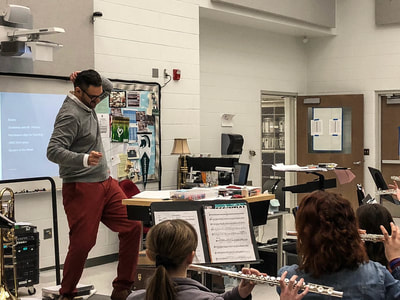
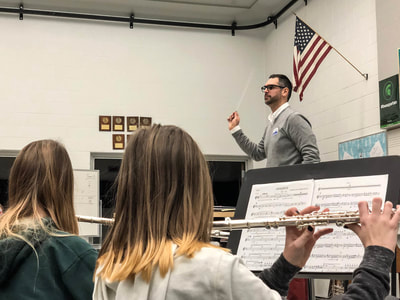
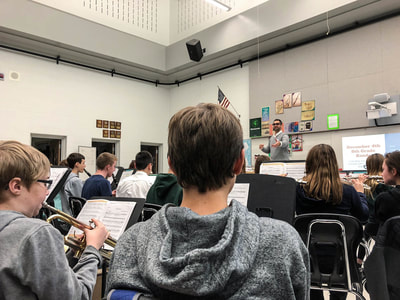
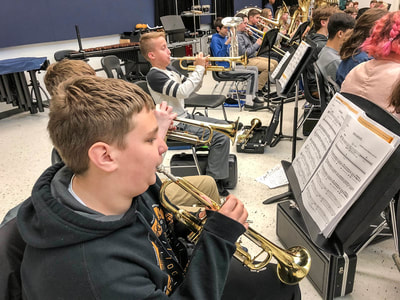
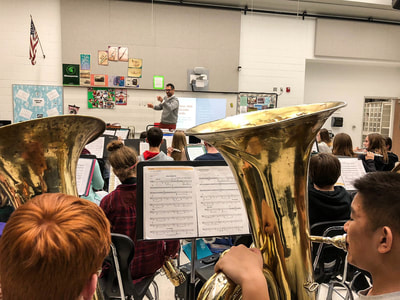
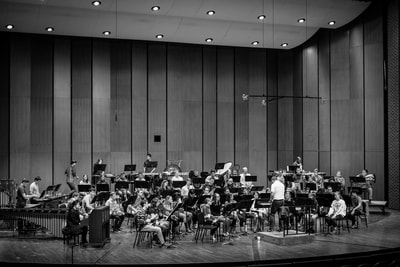
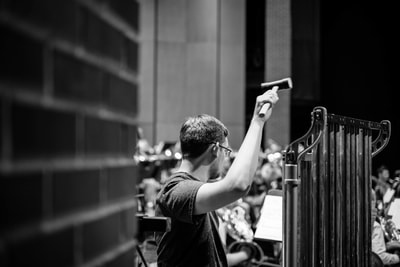
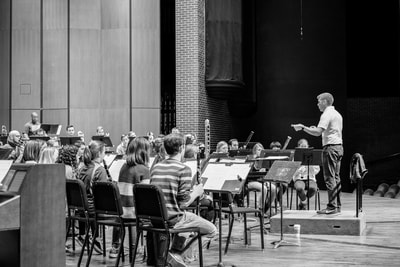
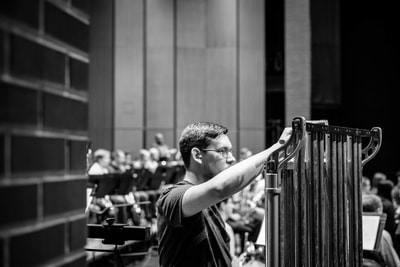
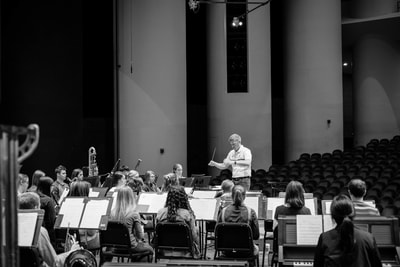
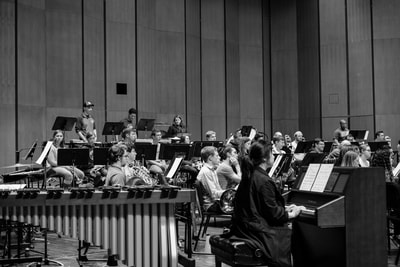
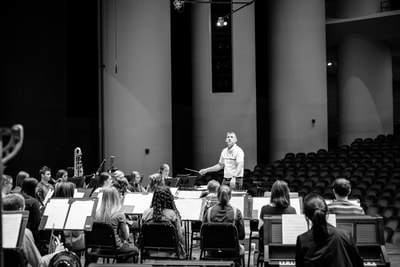
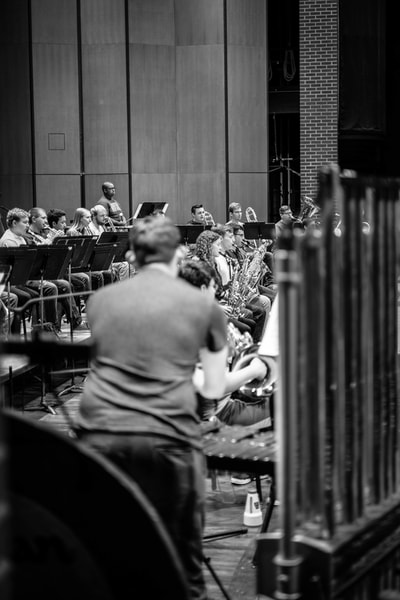
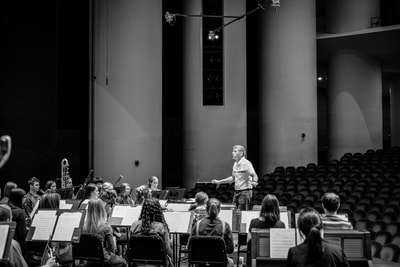
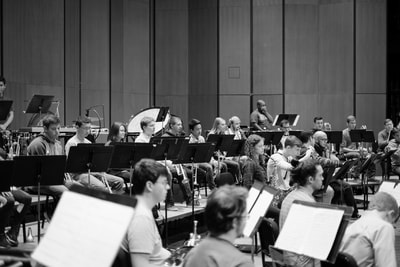
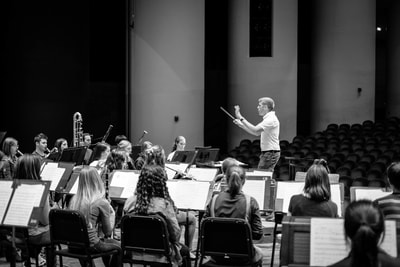
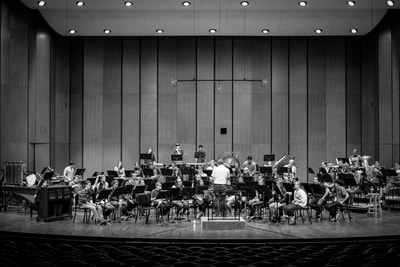
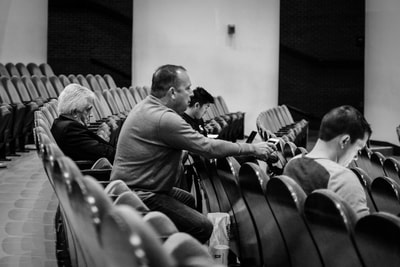
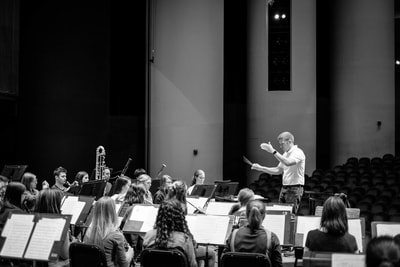
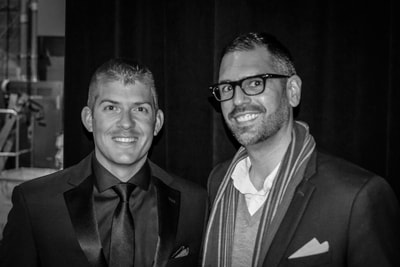
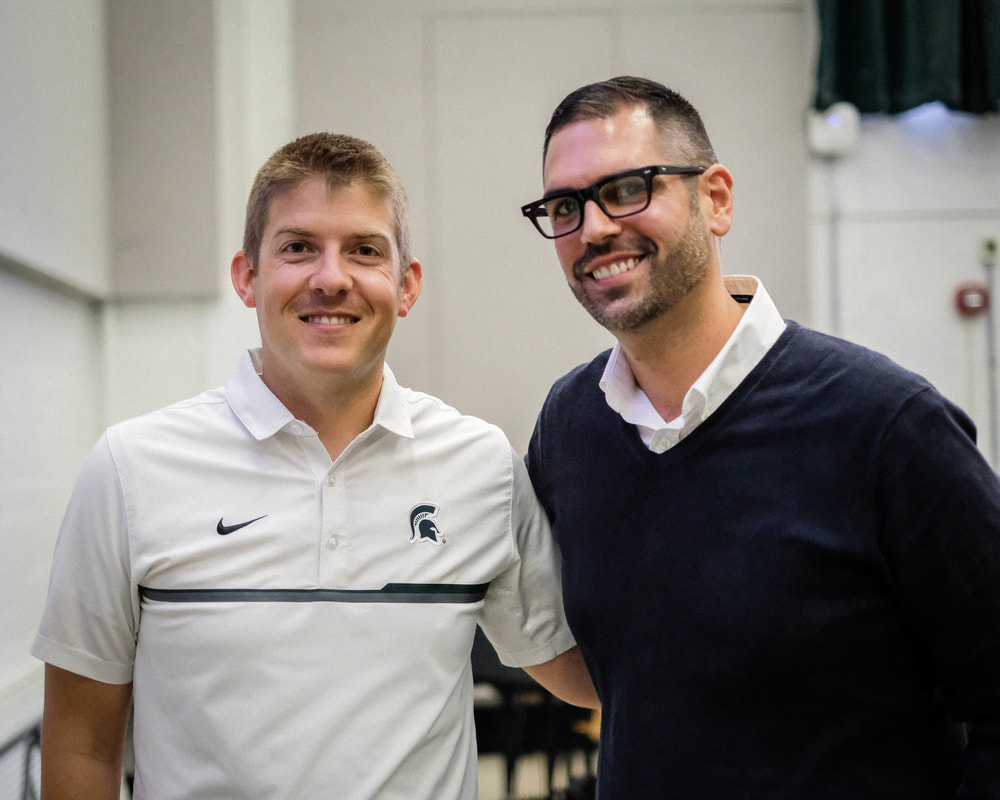
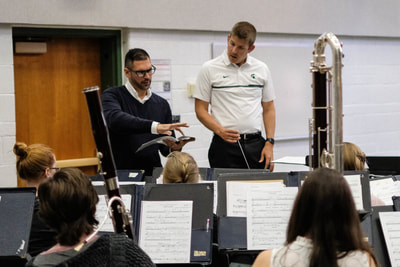
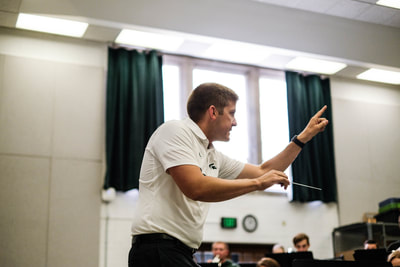
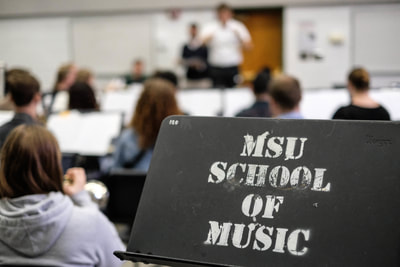
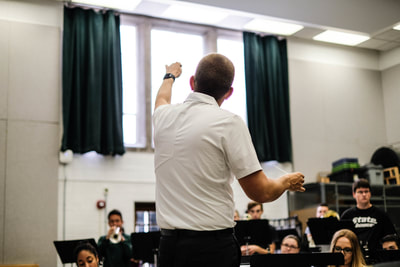
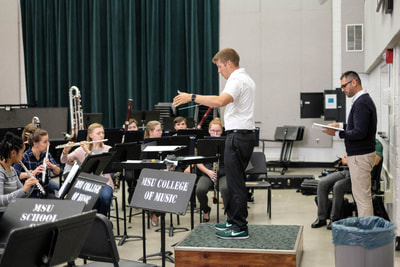
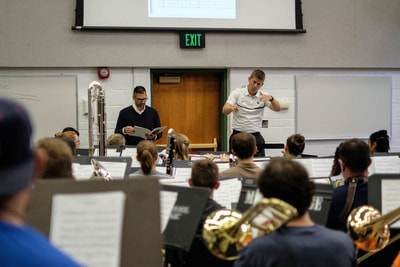
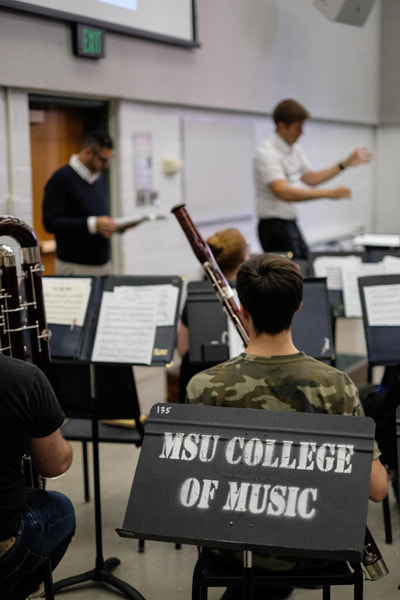
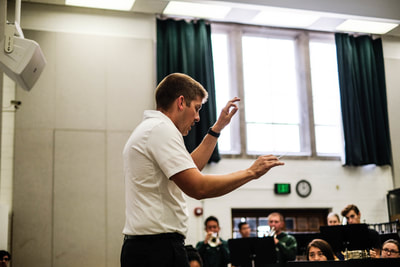
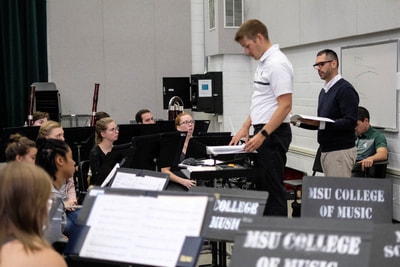
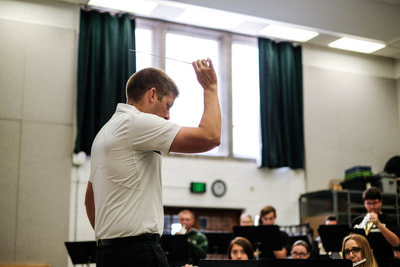
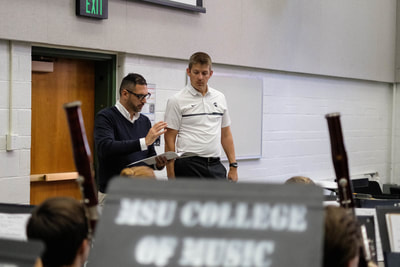
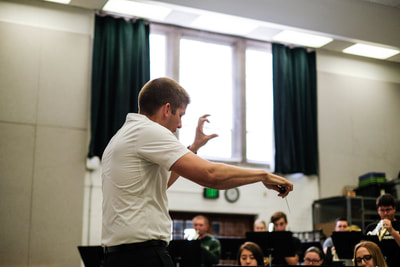
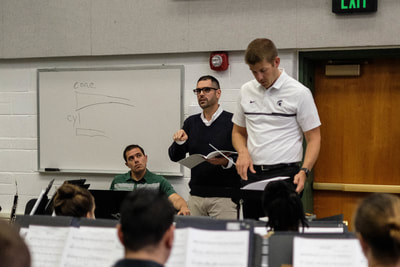
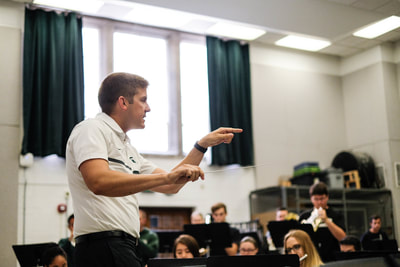
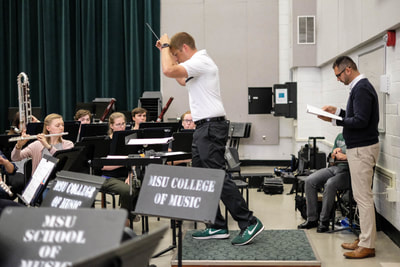
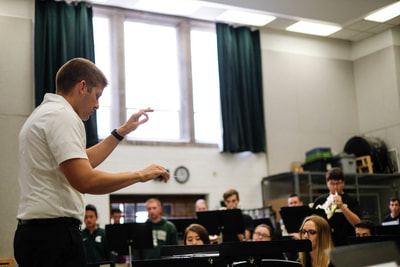
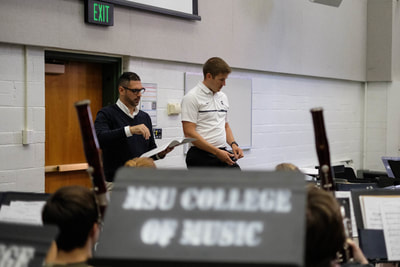
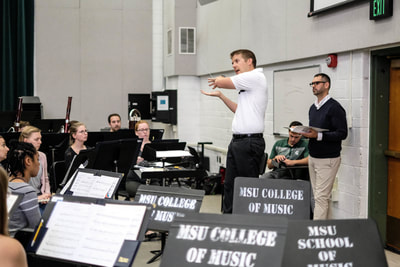
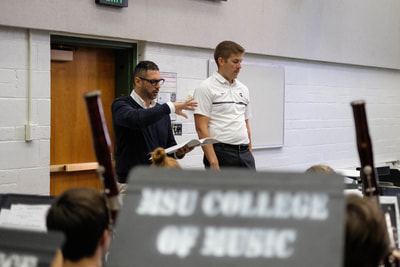
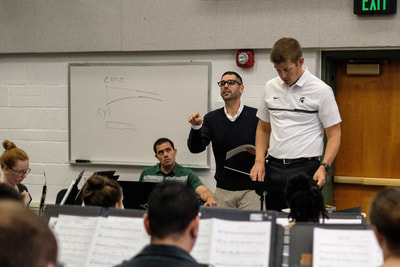
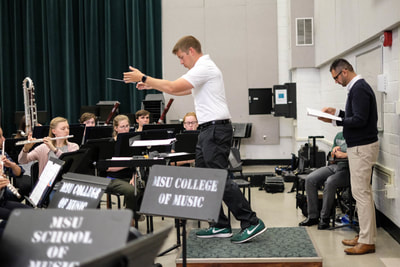
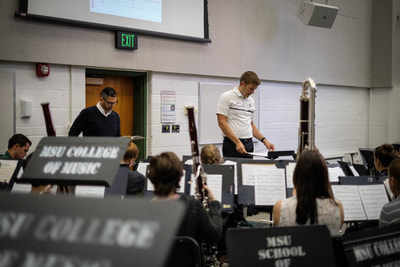
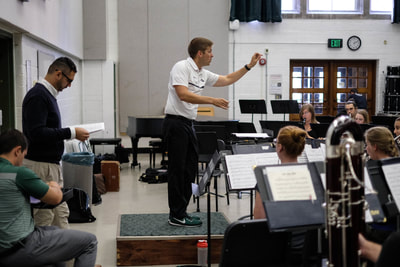
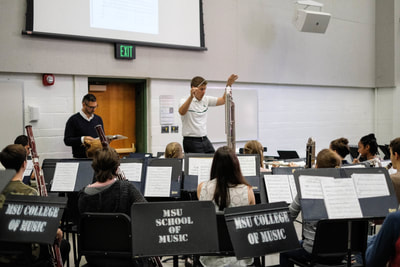
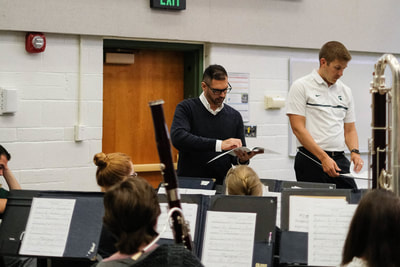
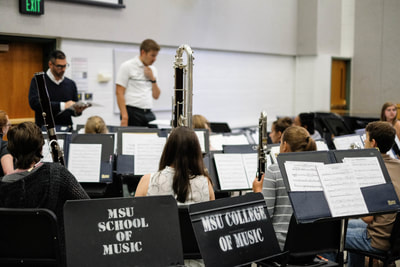
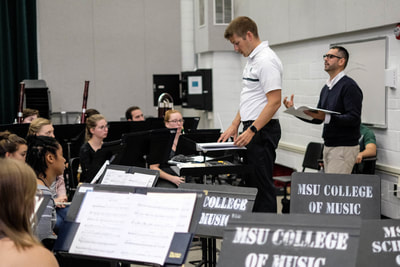
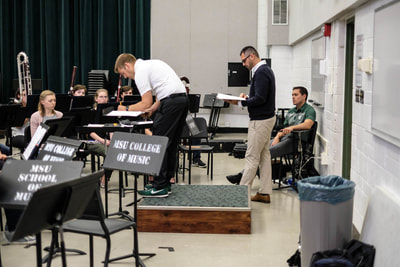
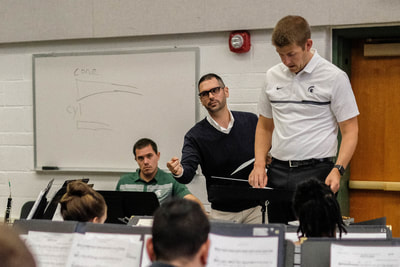
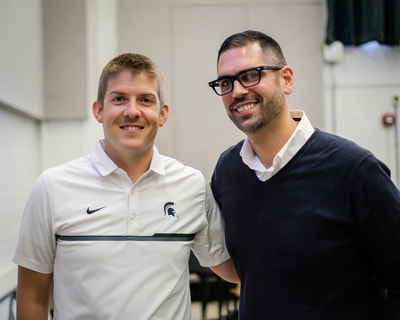
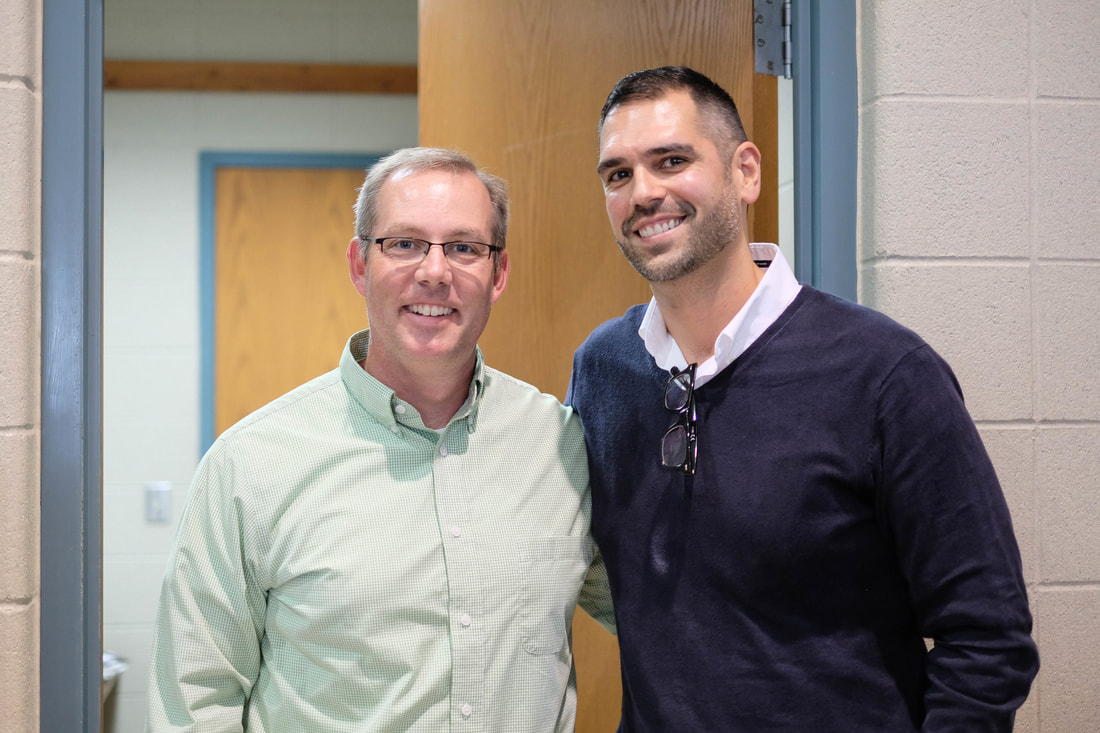
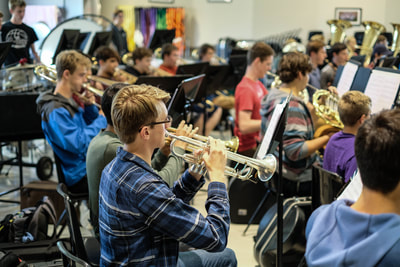
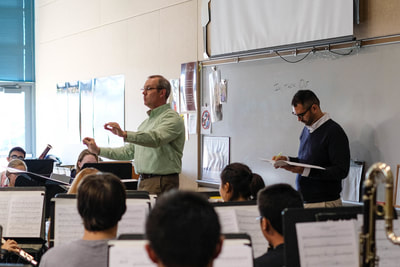

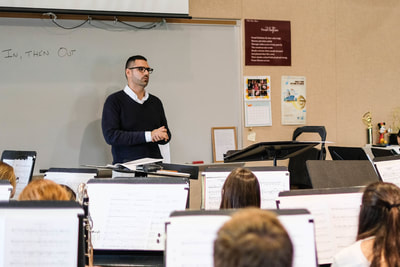
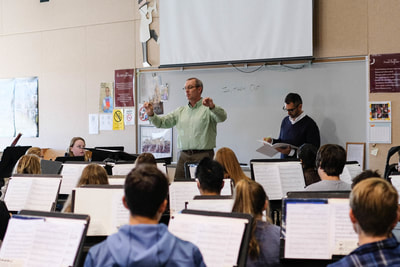
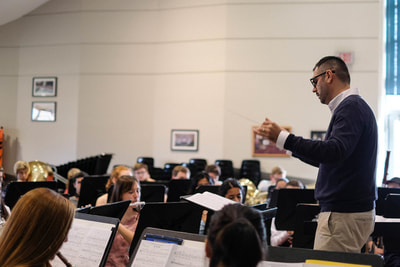
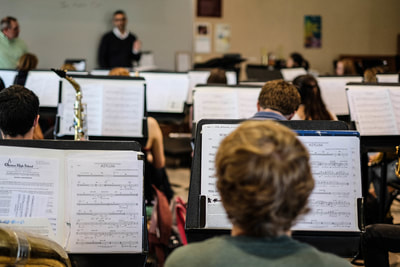
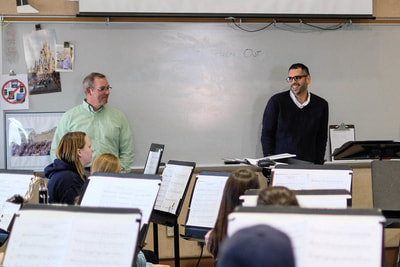
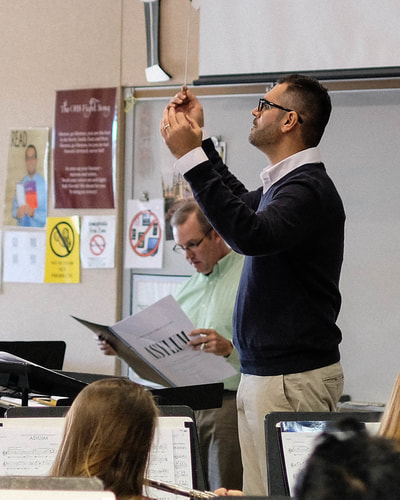
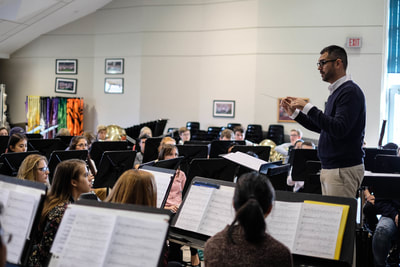
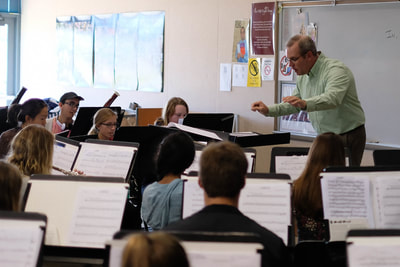
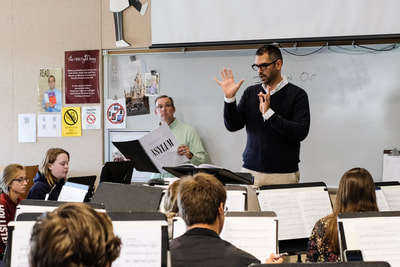
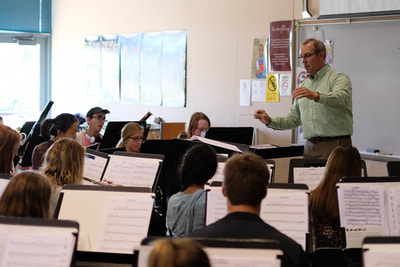
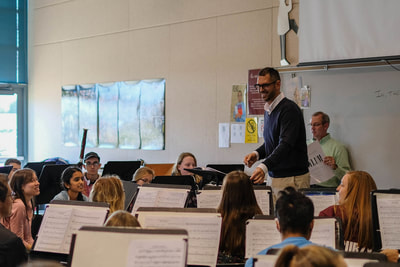
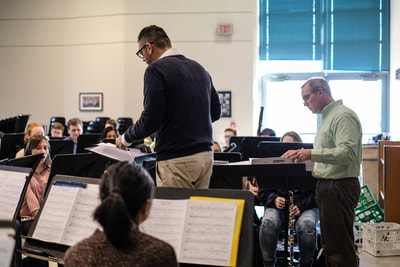
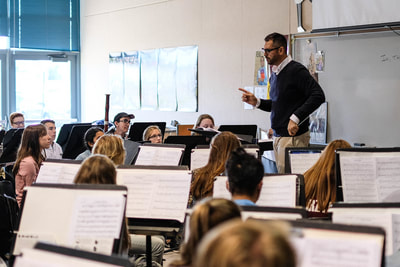
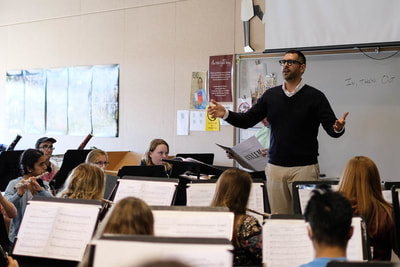
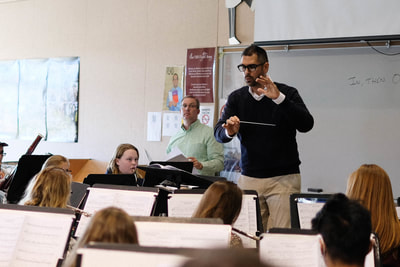
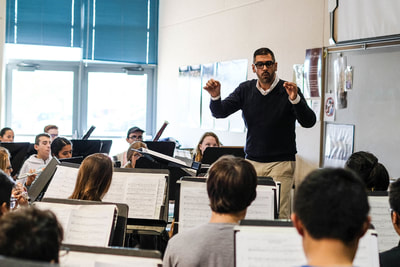
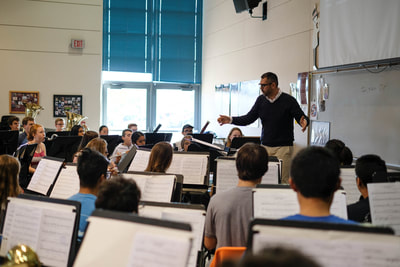
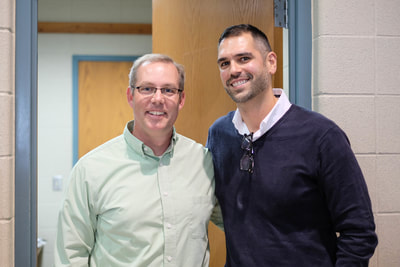
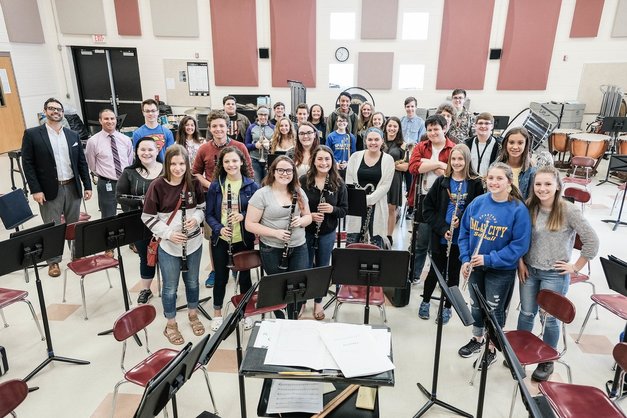
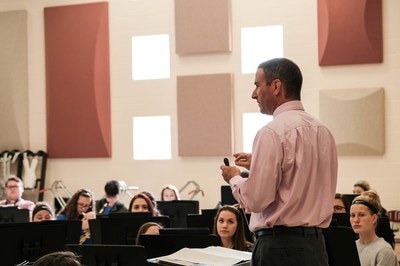
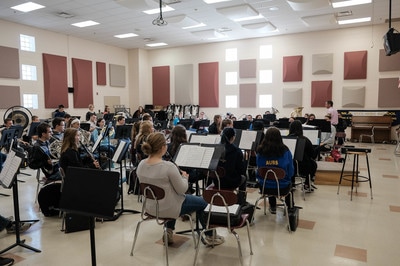
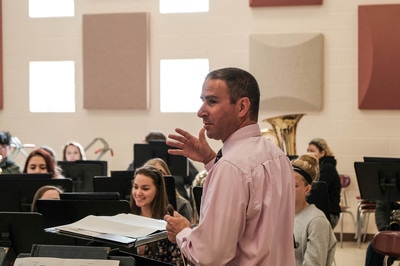
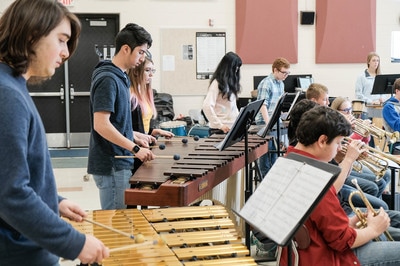
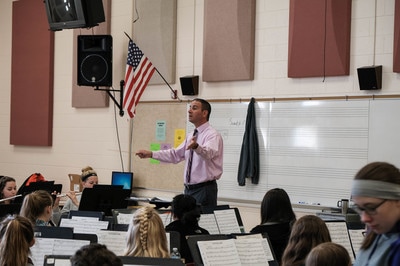
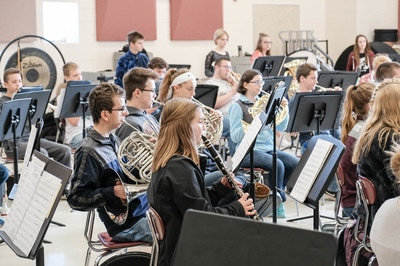
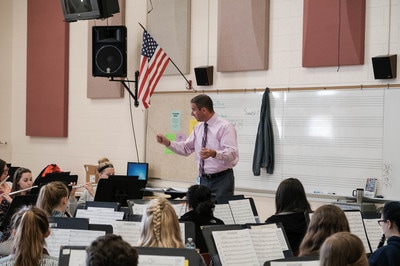
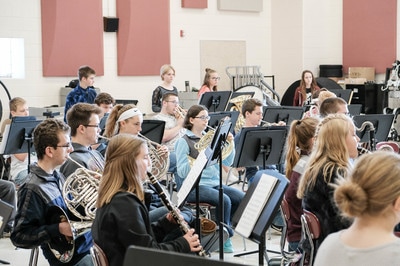
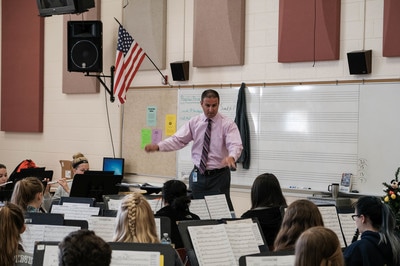
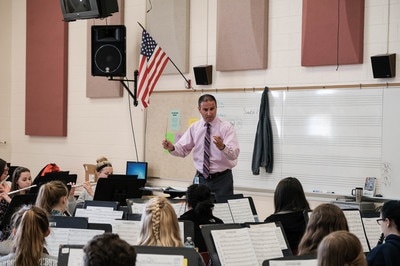
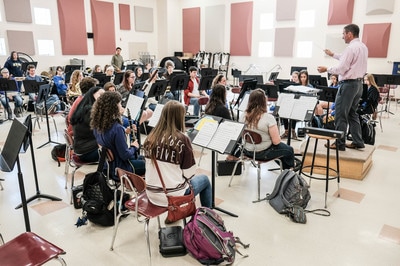
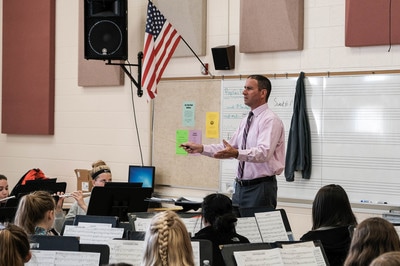
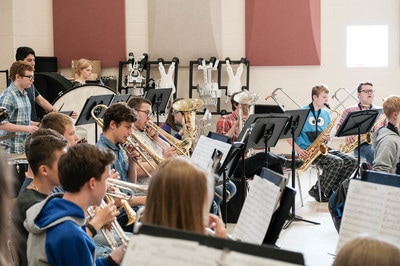
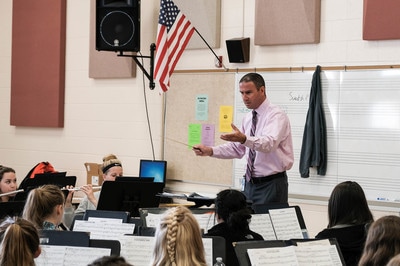
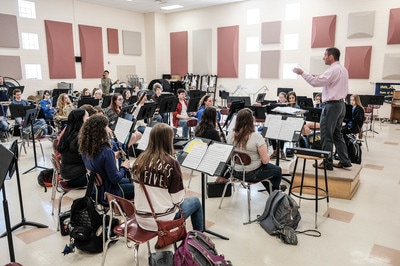
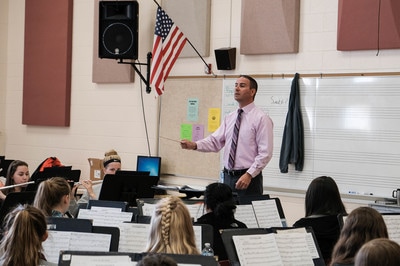
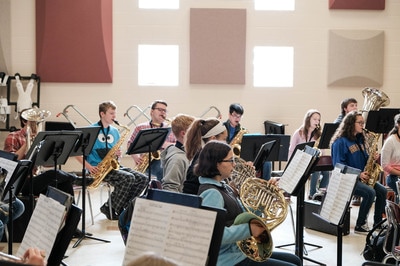
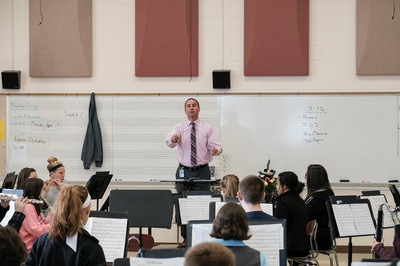
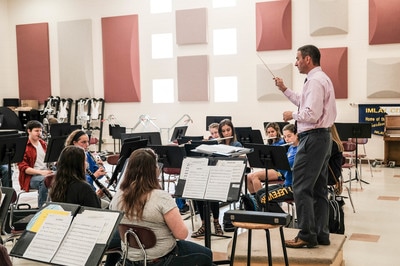
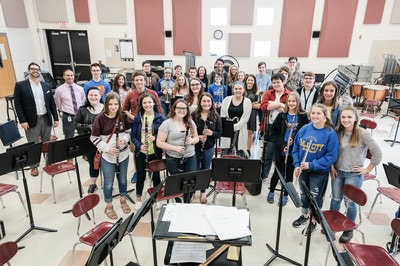
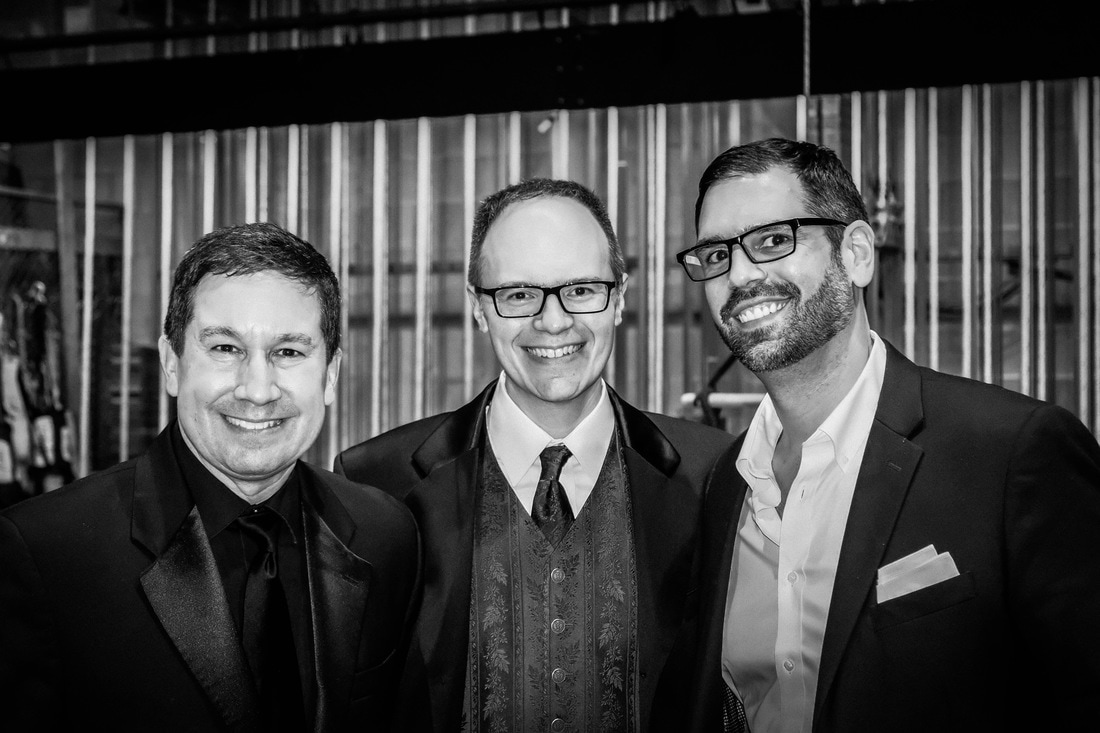
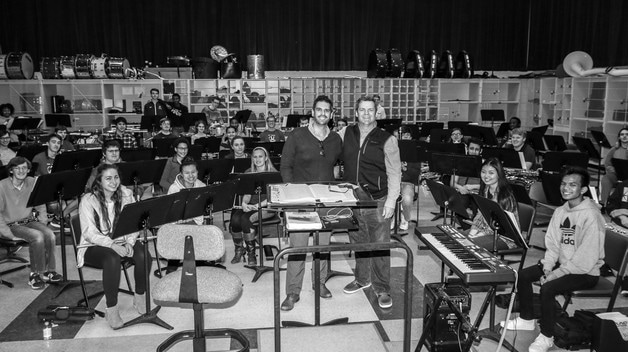
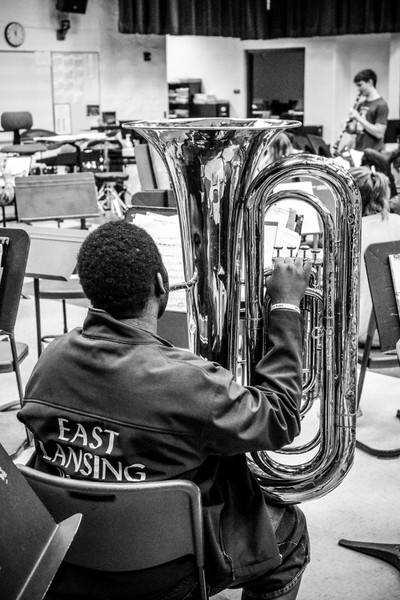
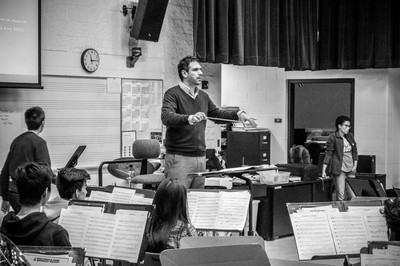
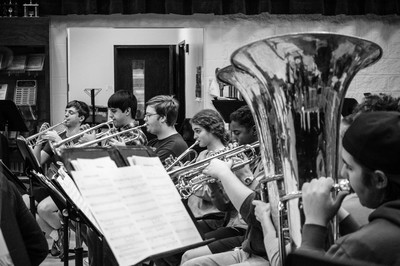
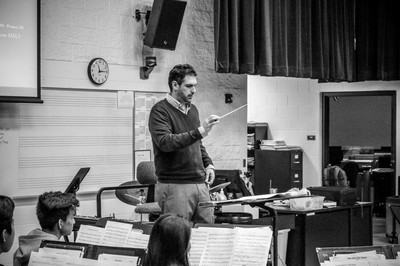
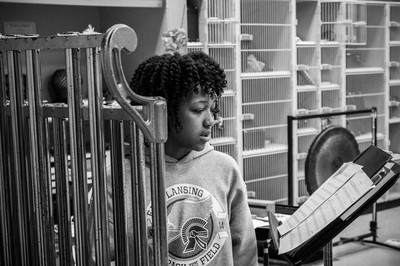
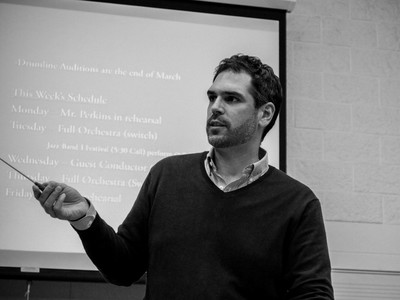
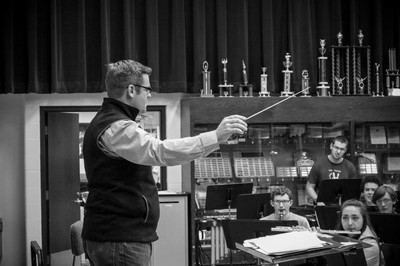
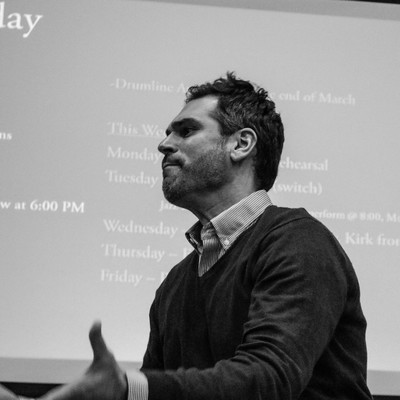
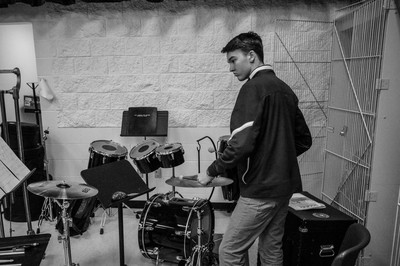
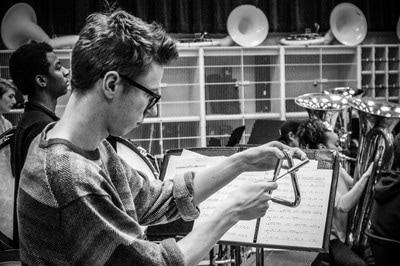
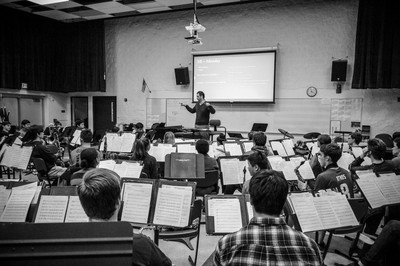
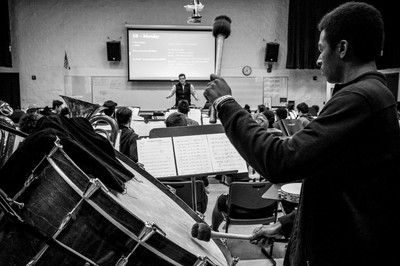
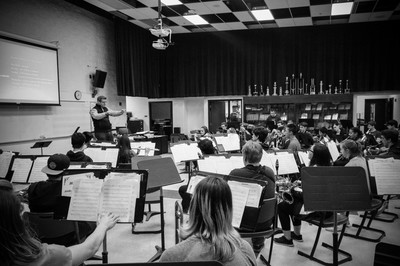
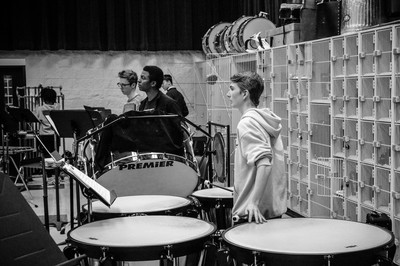
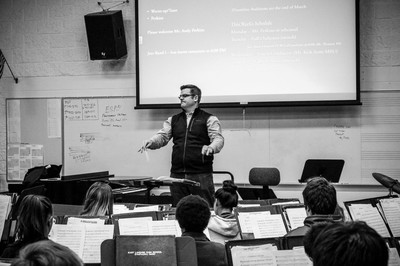
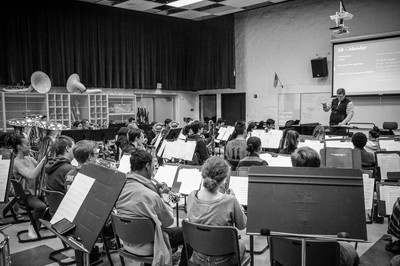
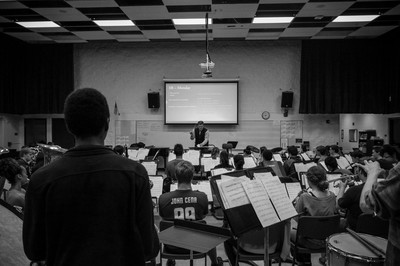
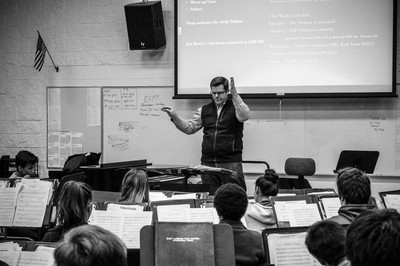
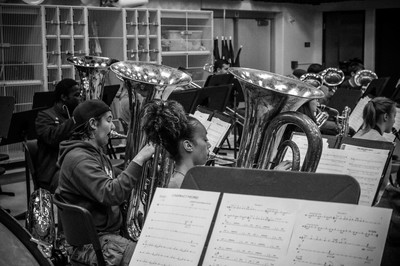
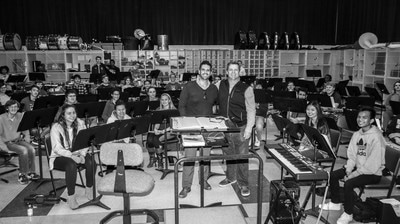
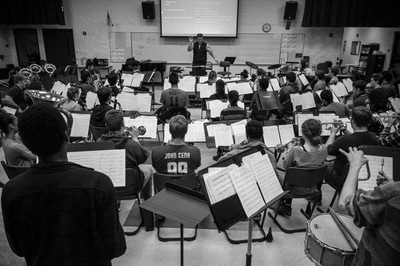

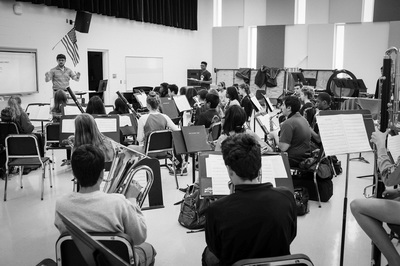
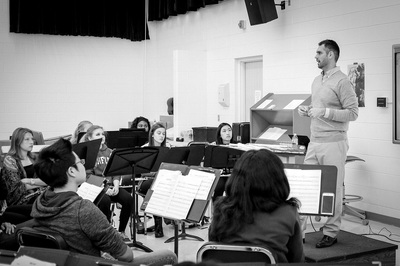
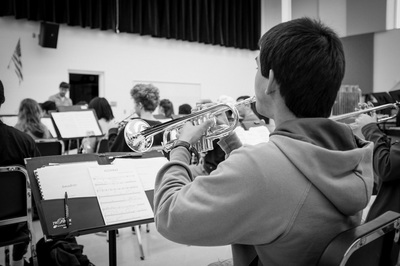
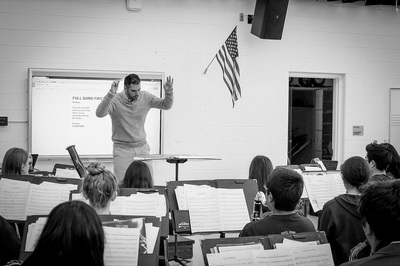
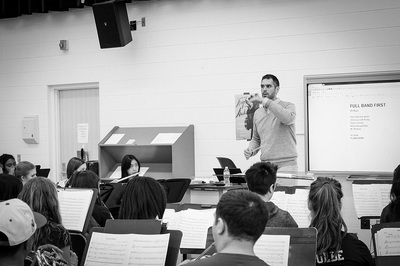
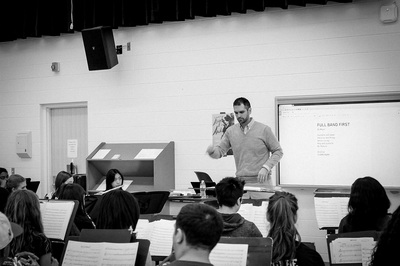
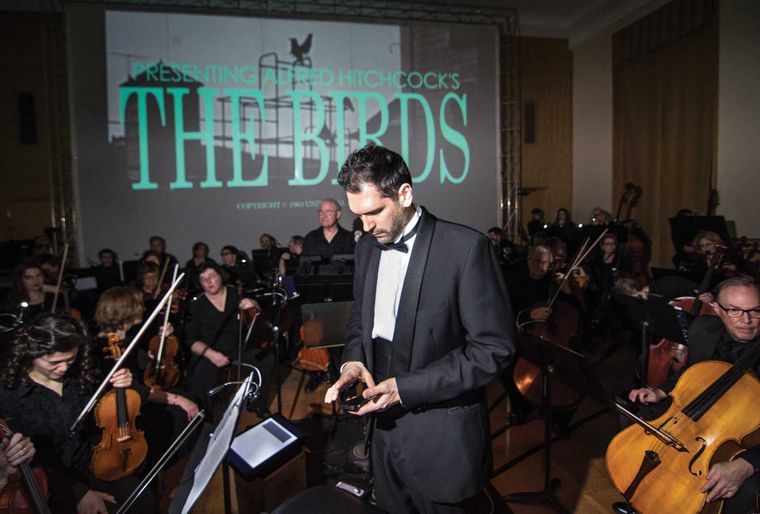
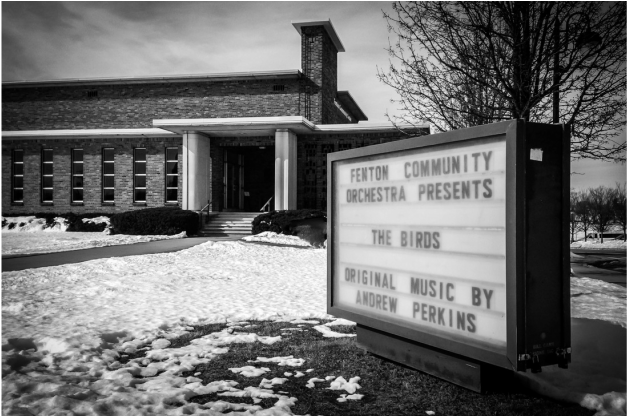
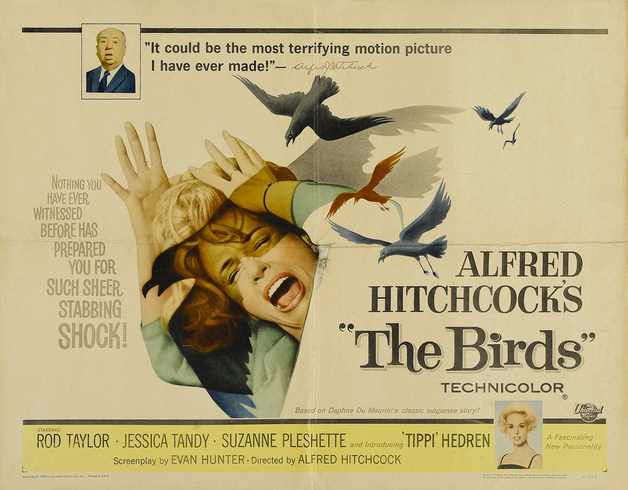
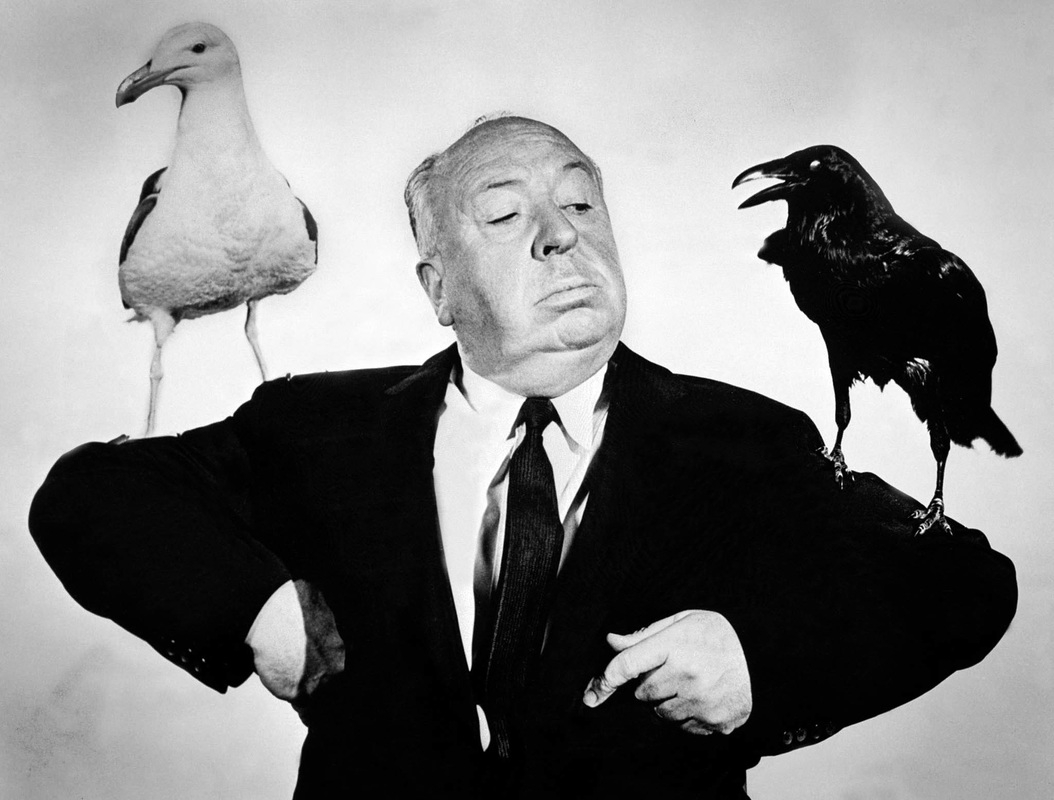
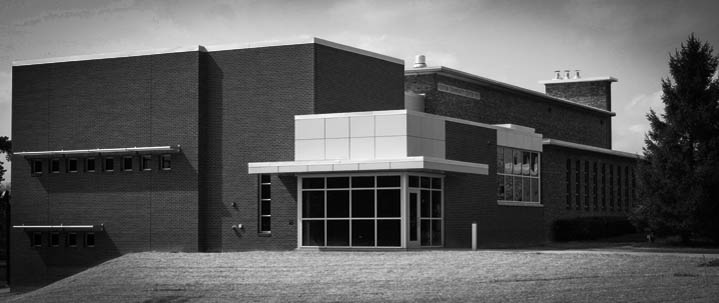
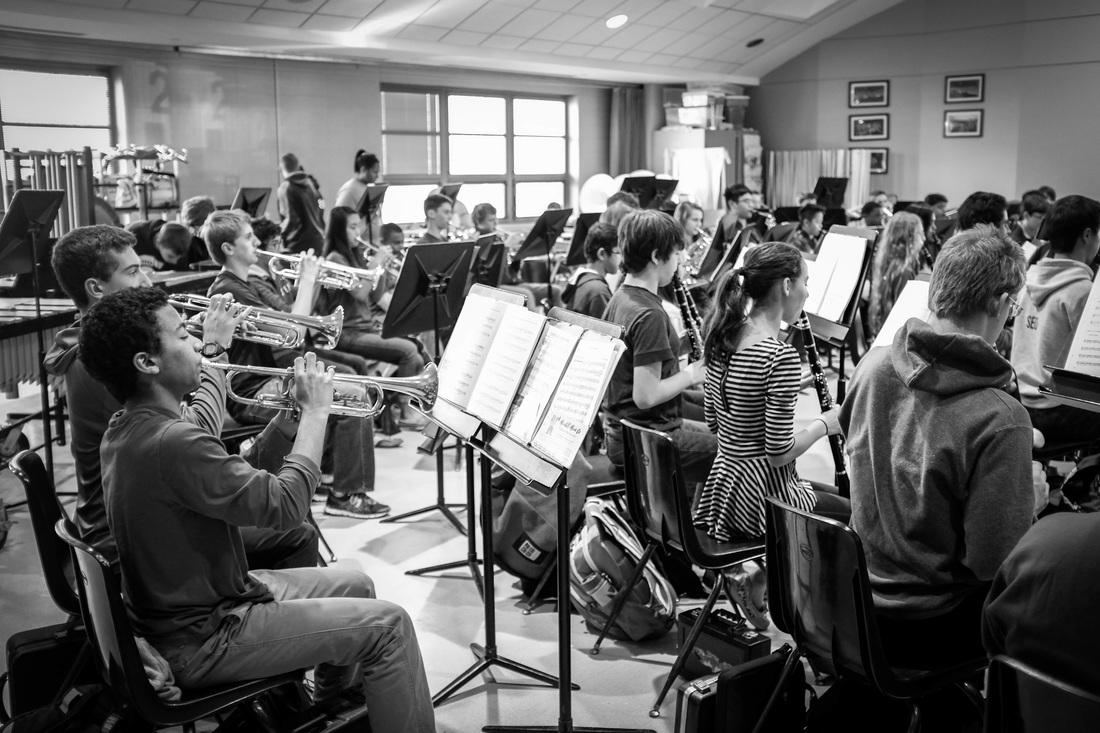
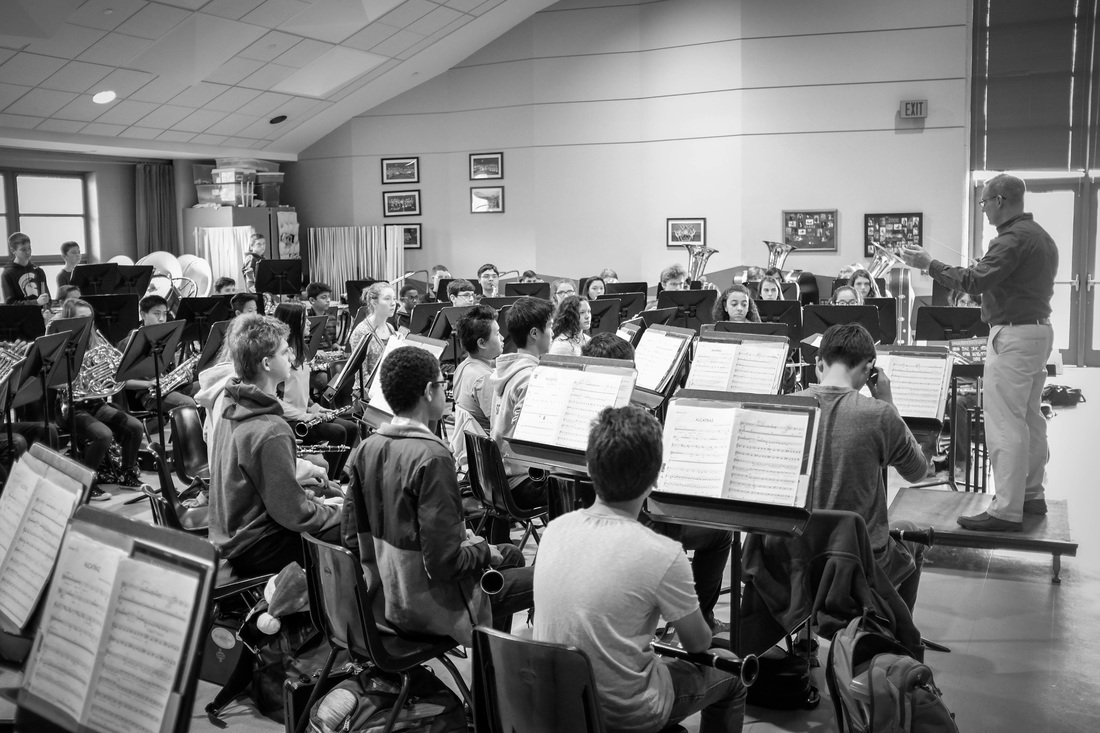
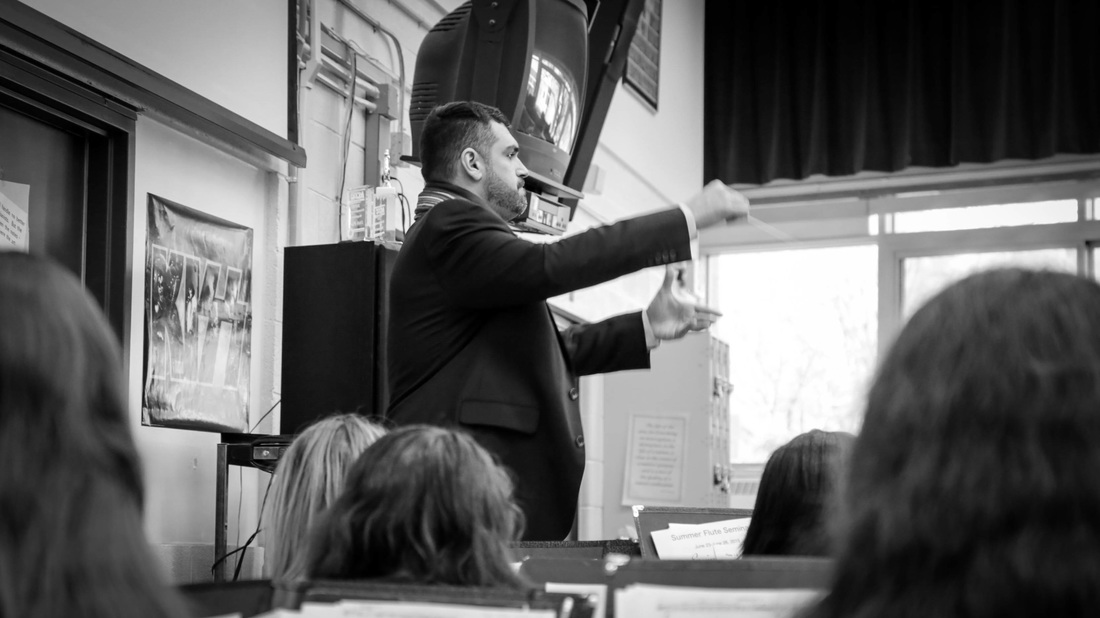
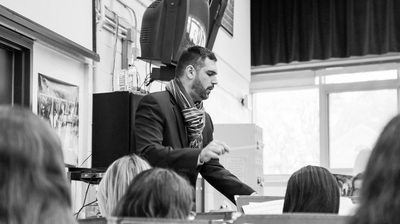
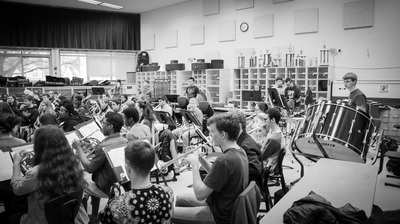
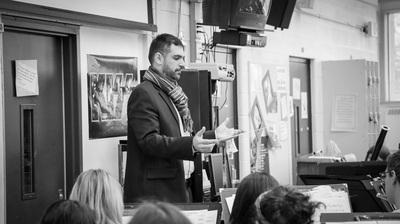
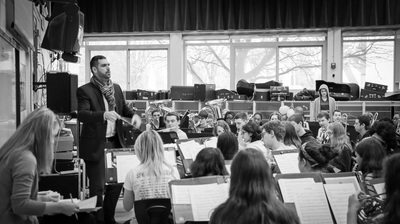
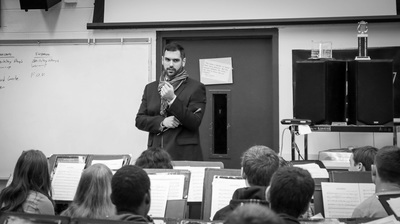
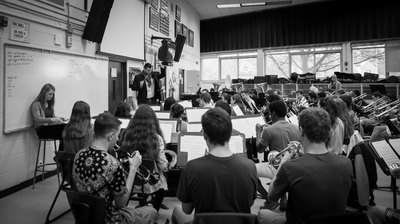
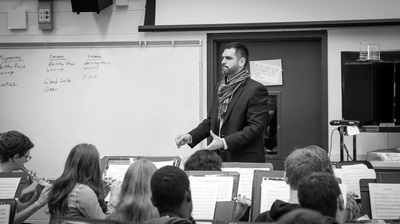
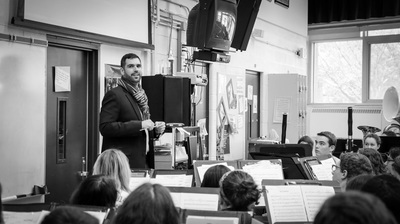
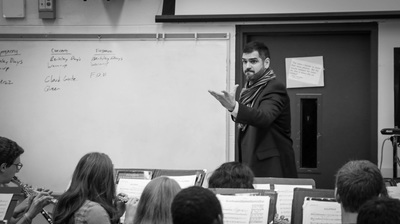
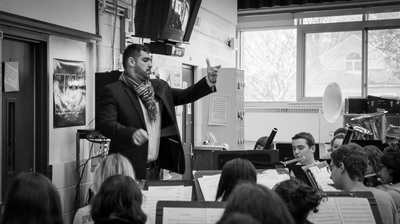
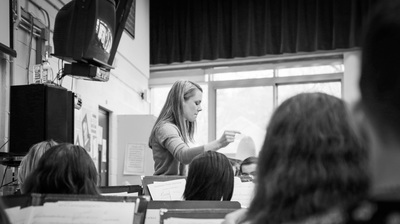
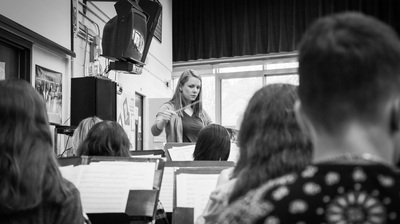
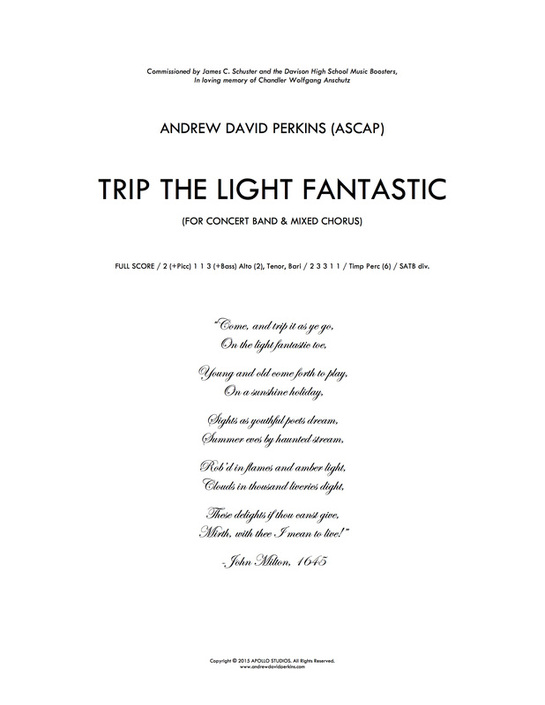


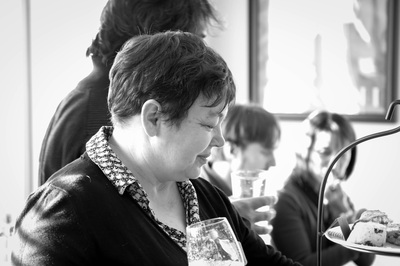
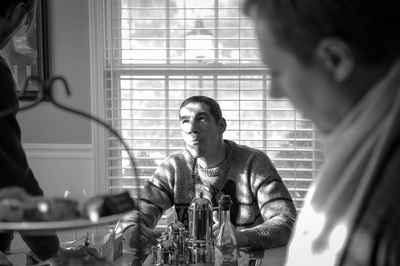
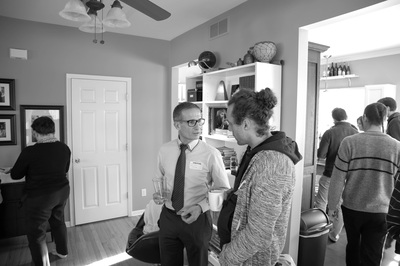
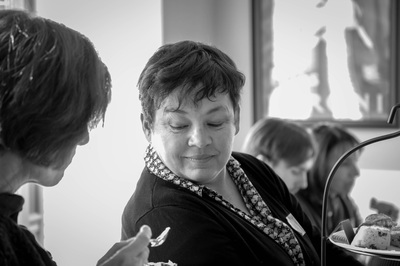
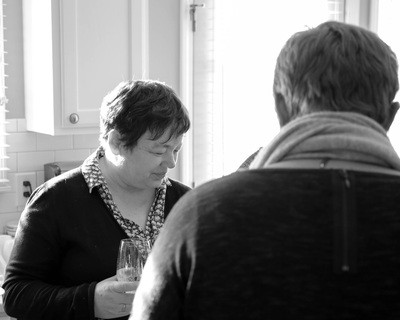
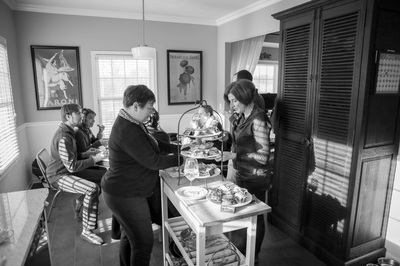
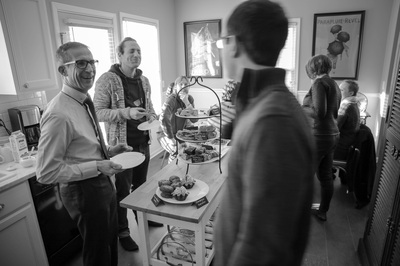
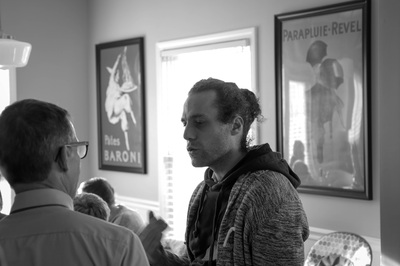
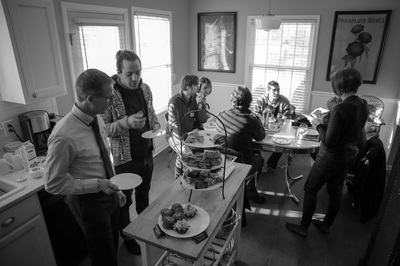
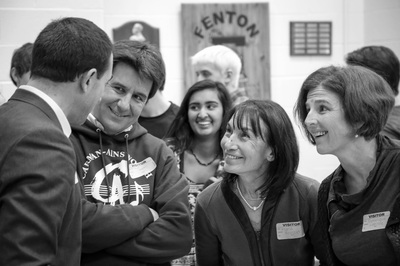
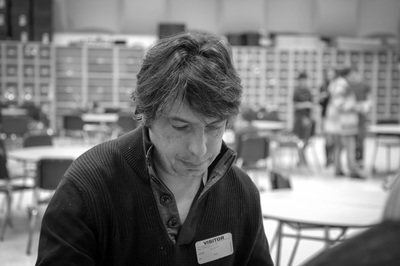
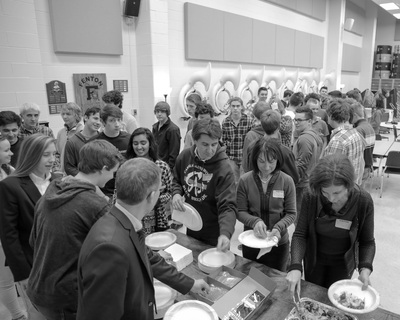
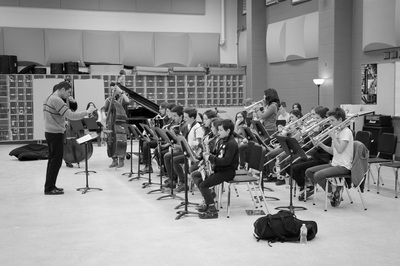
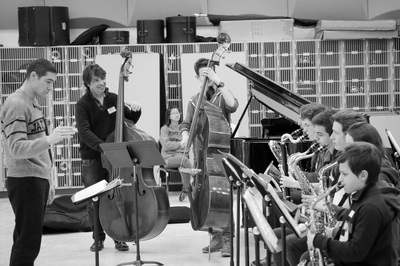
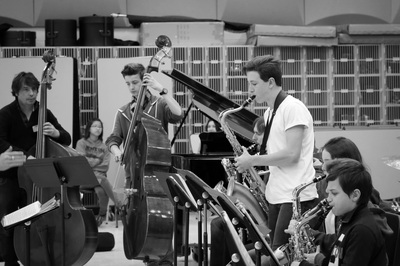
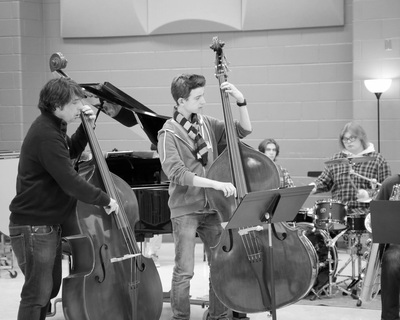
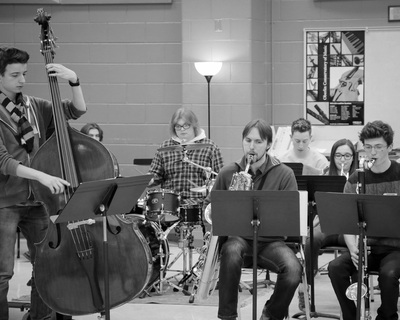
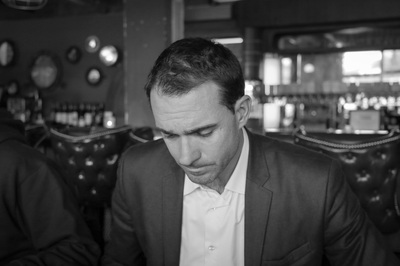
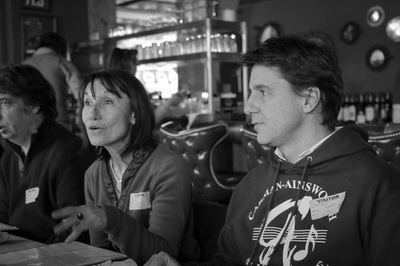
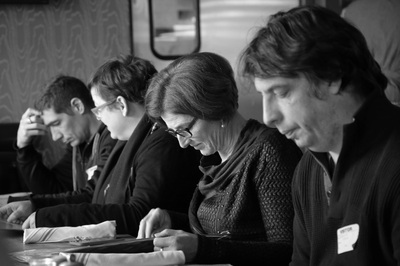
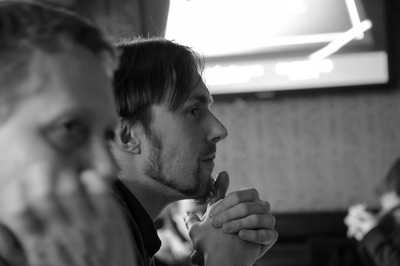
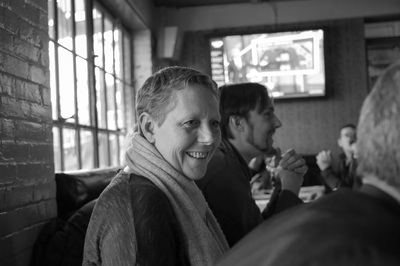
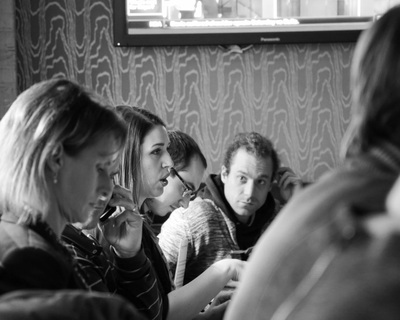

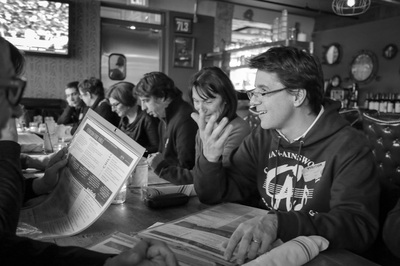
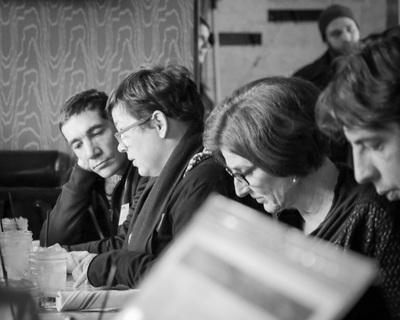
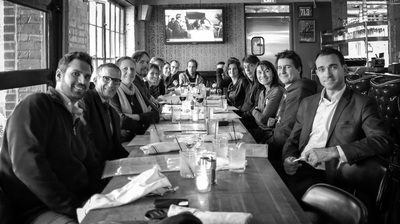

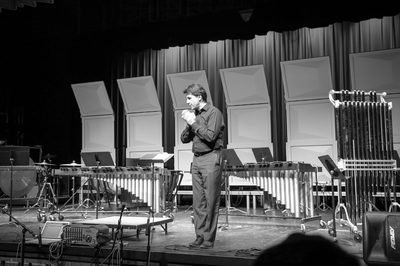
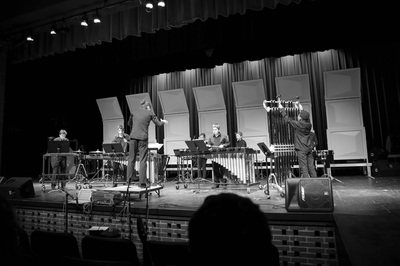
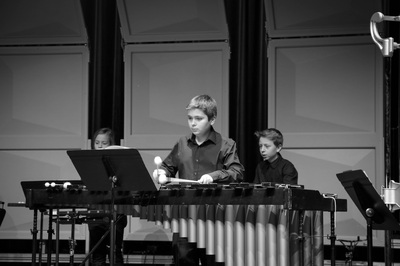
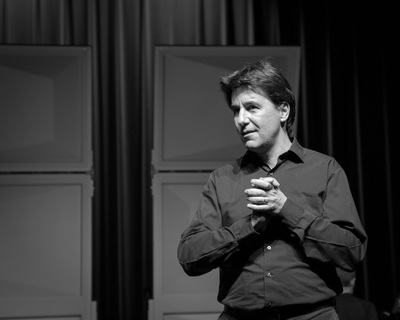
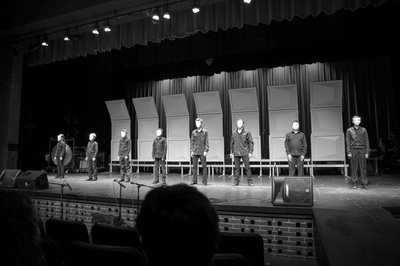
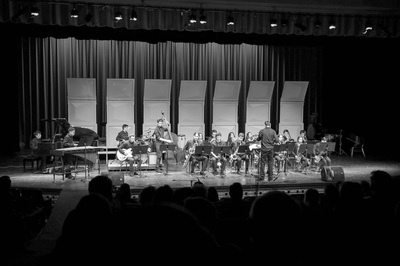
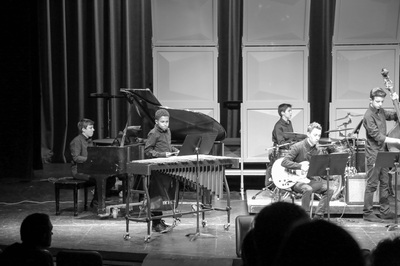
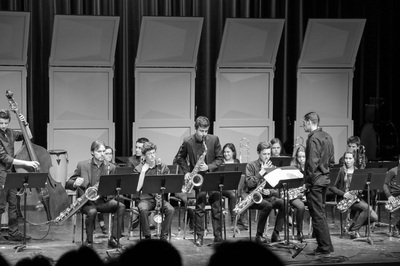
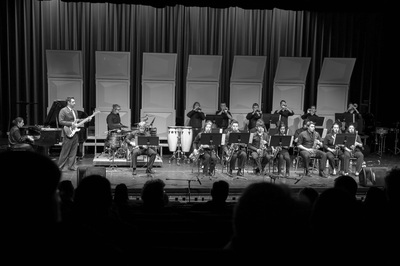
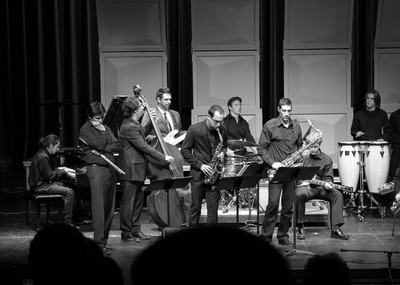
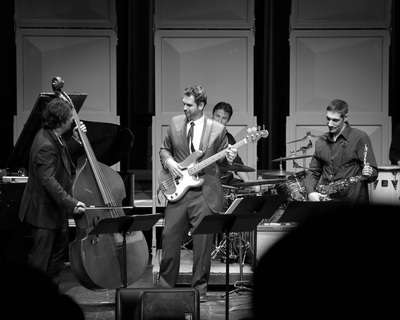
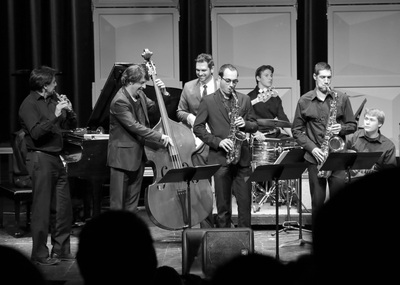
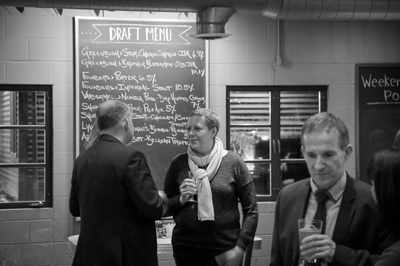
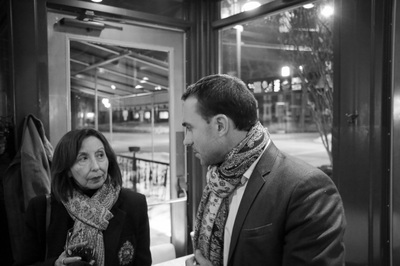
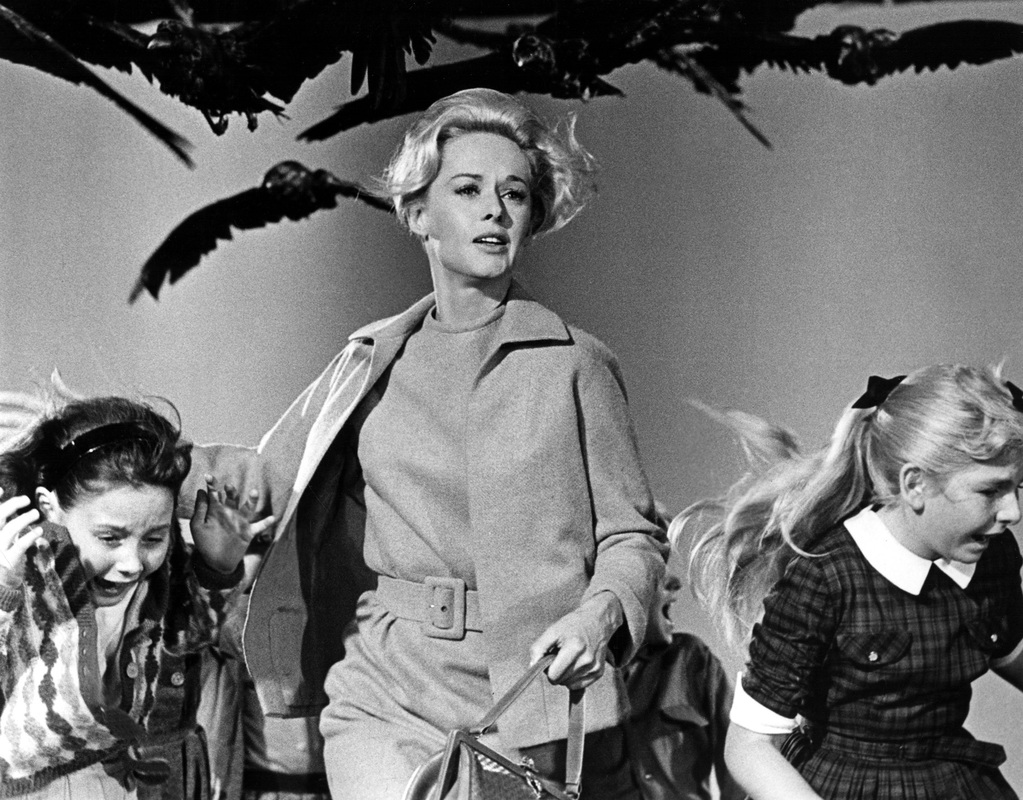

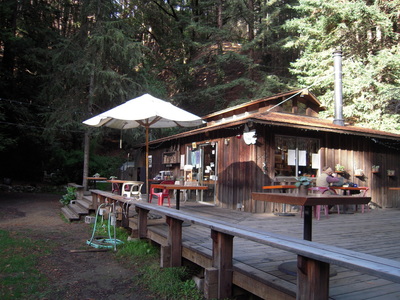
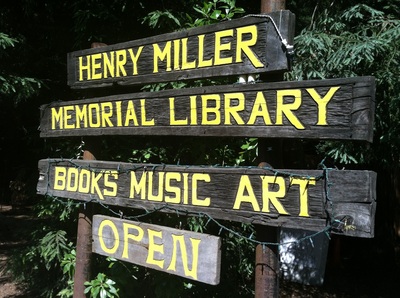
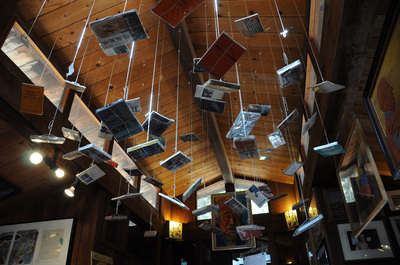

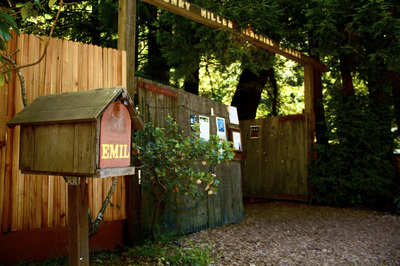
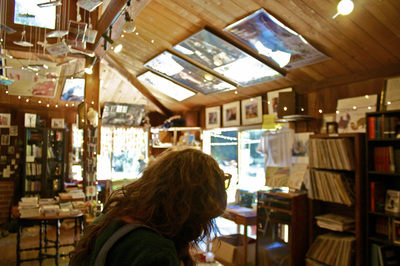
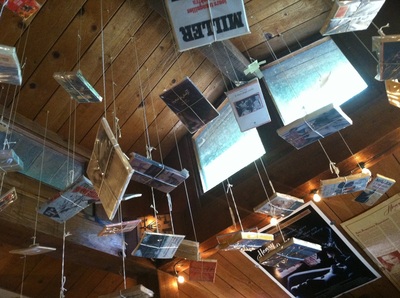
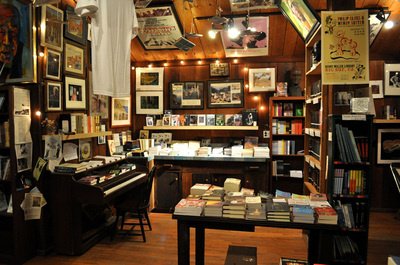
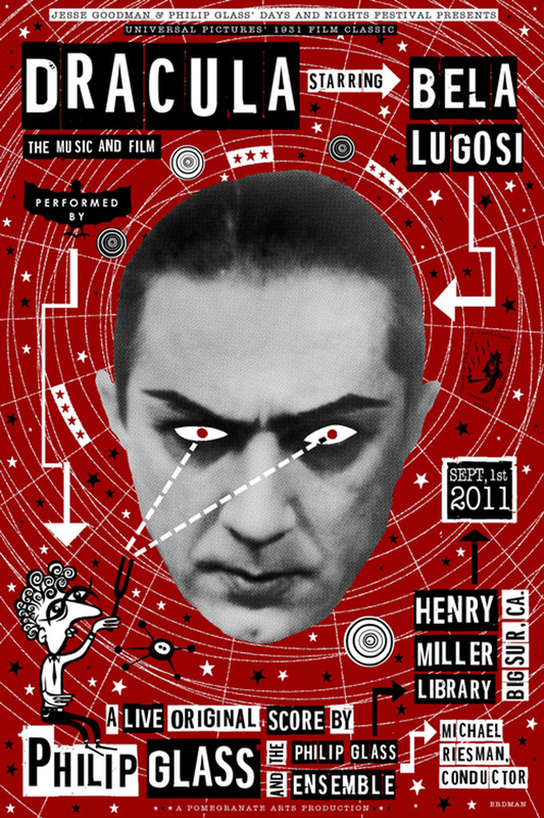
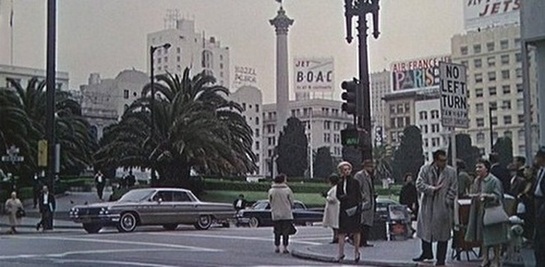
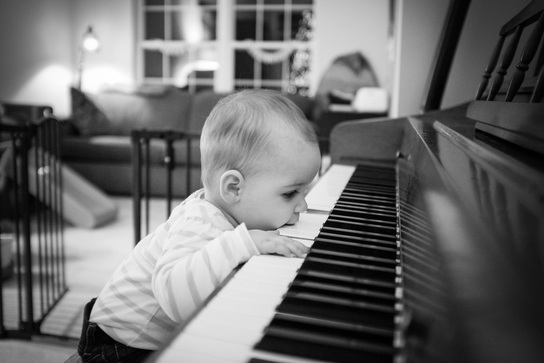
 RSS Feed
RSS Feed